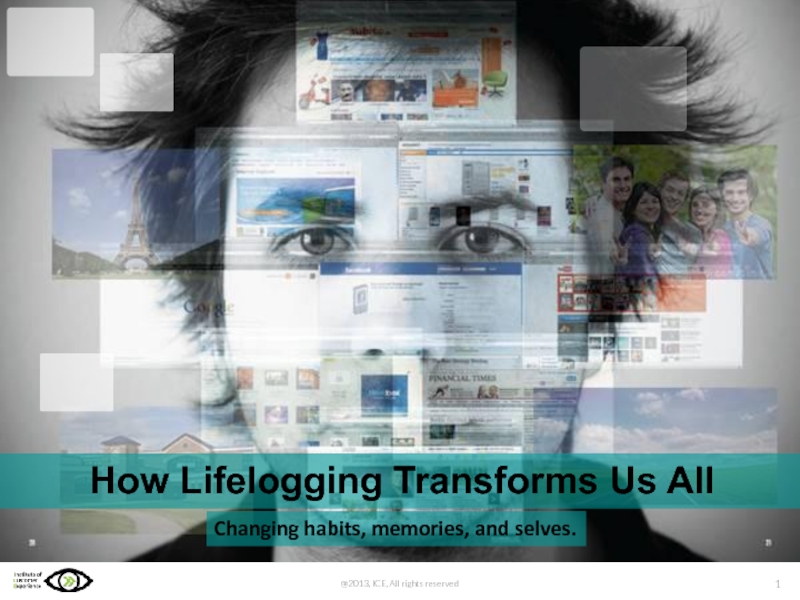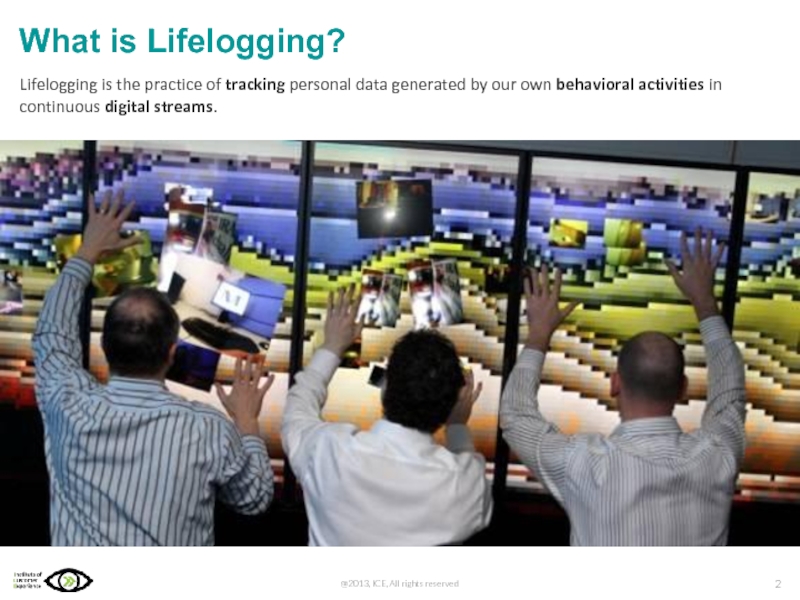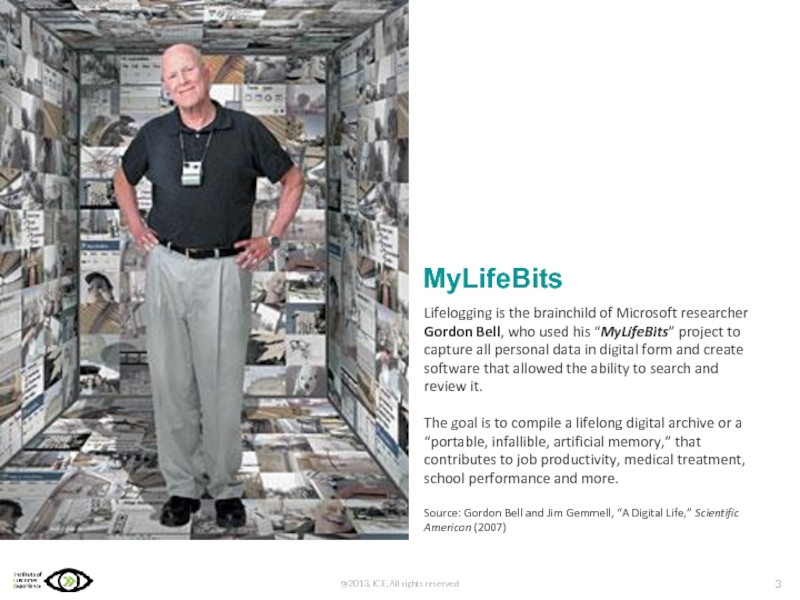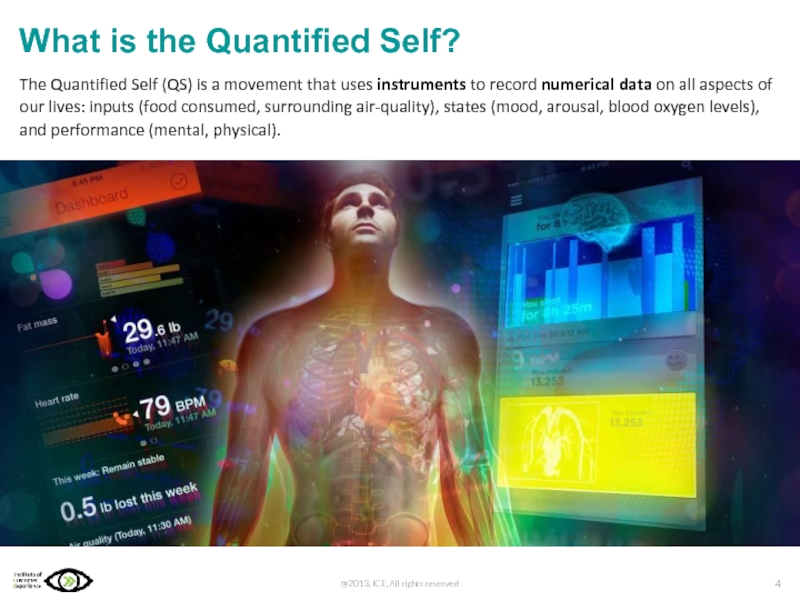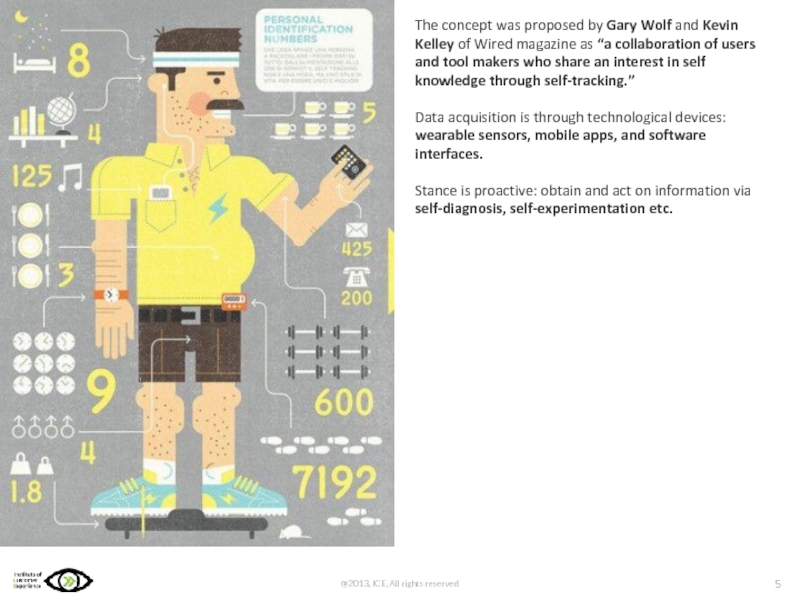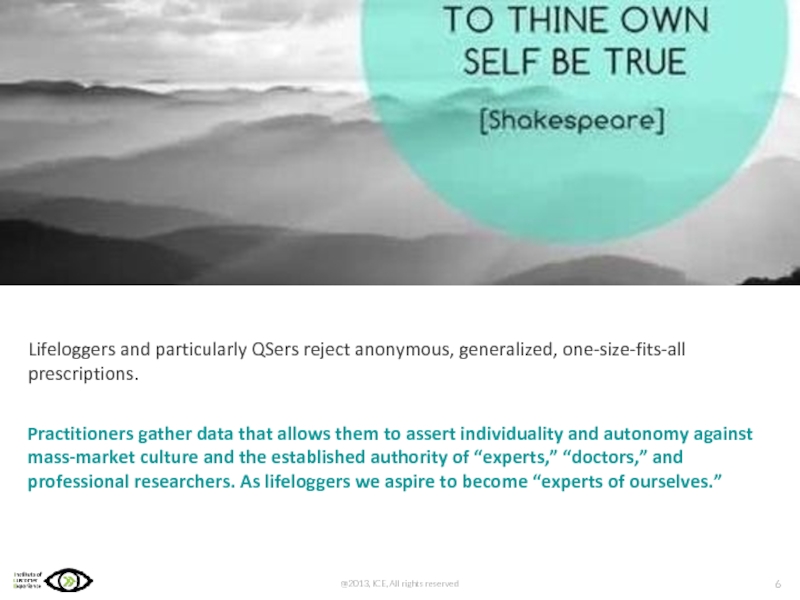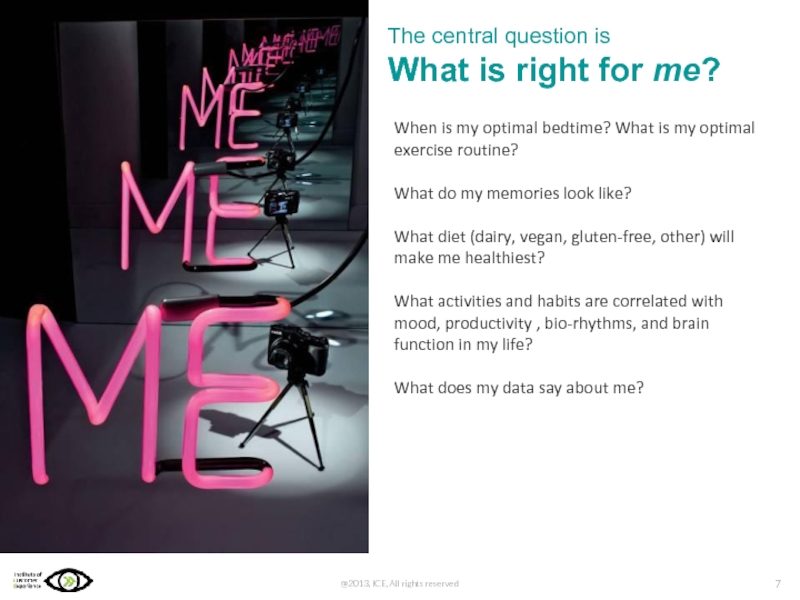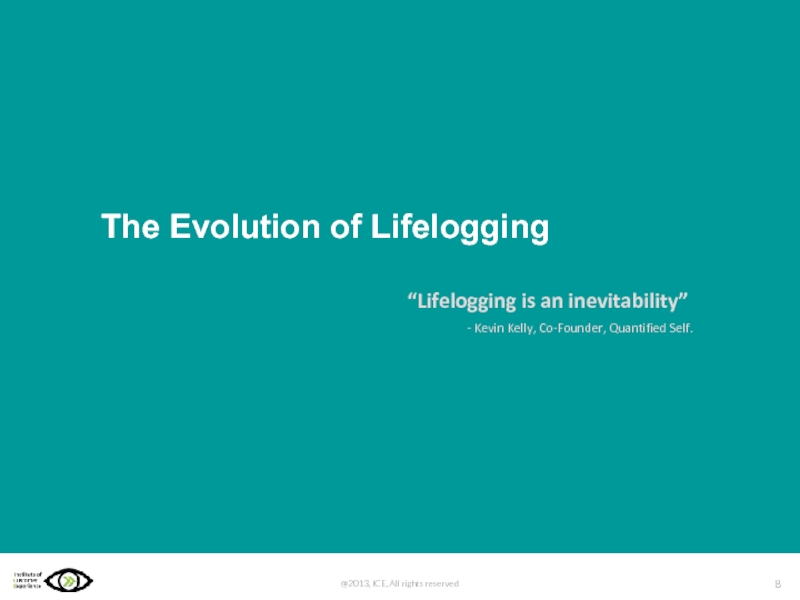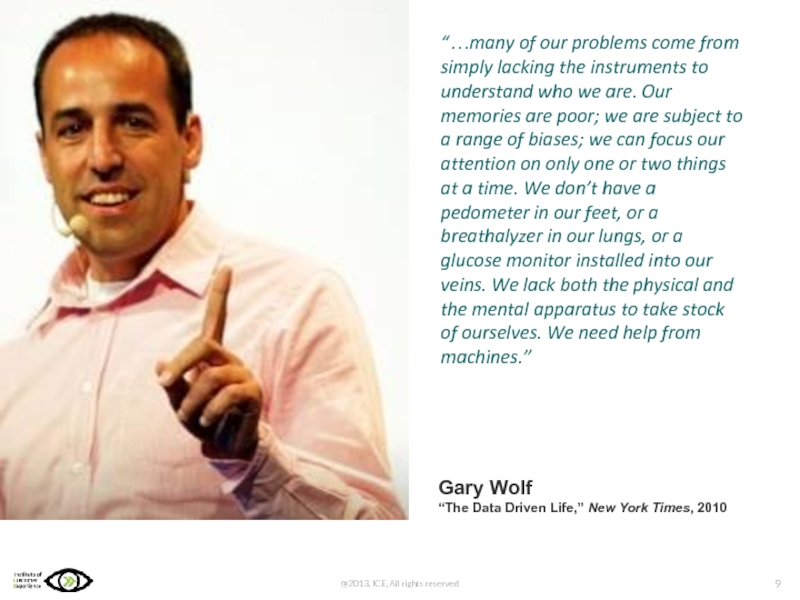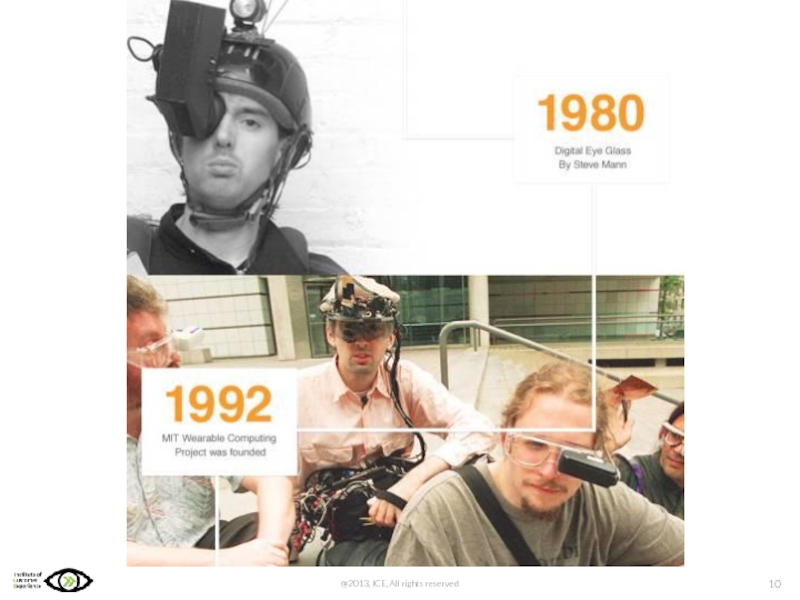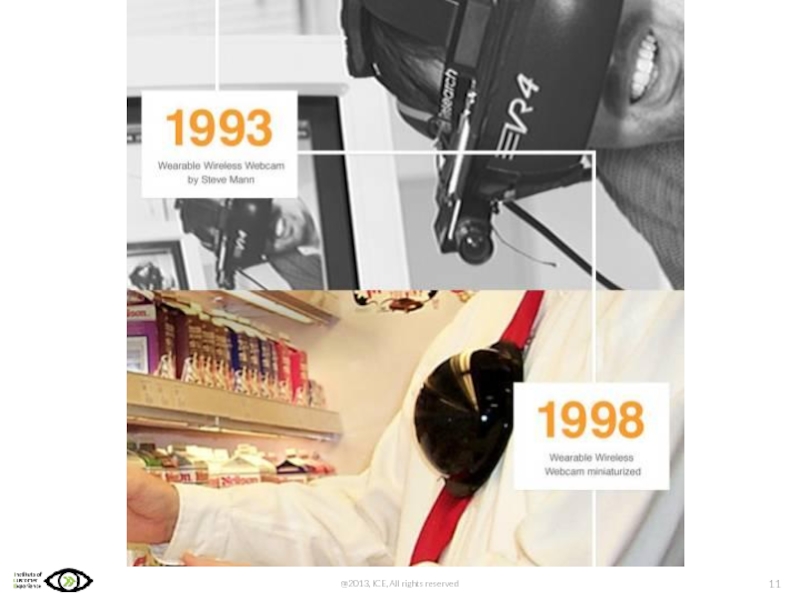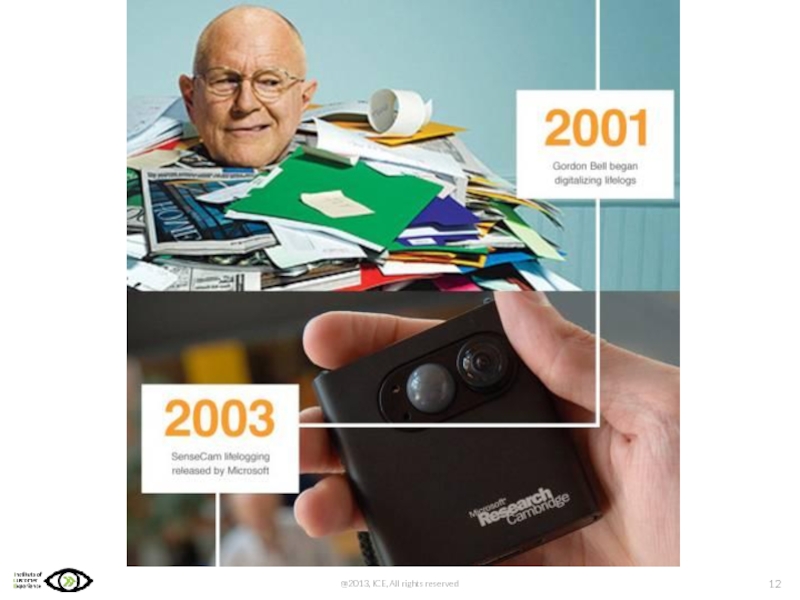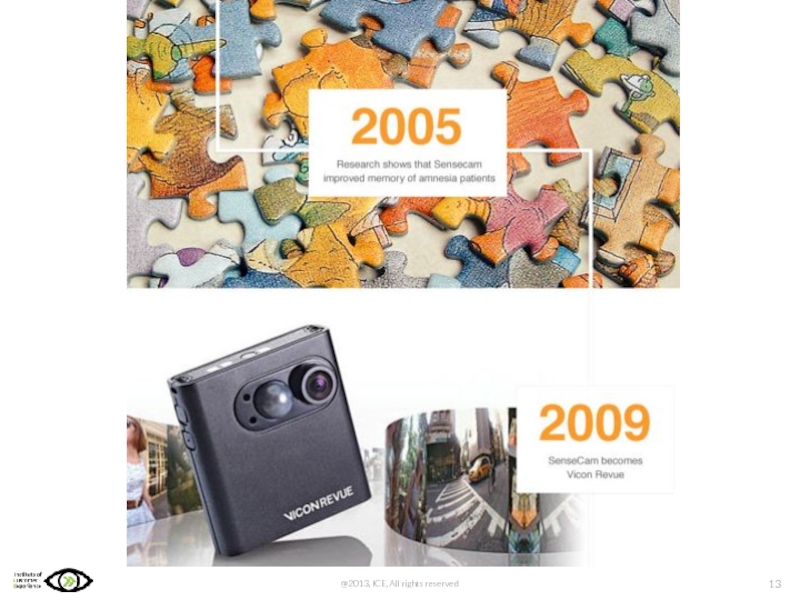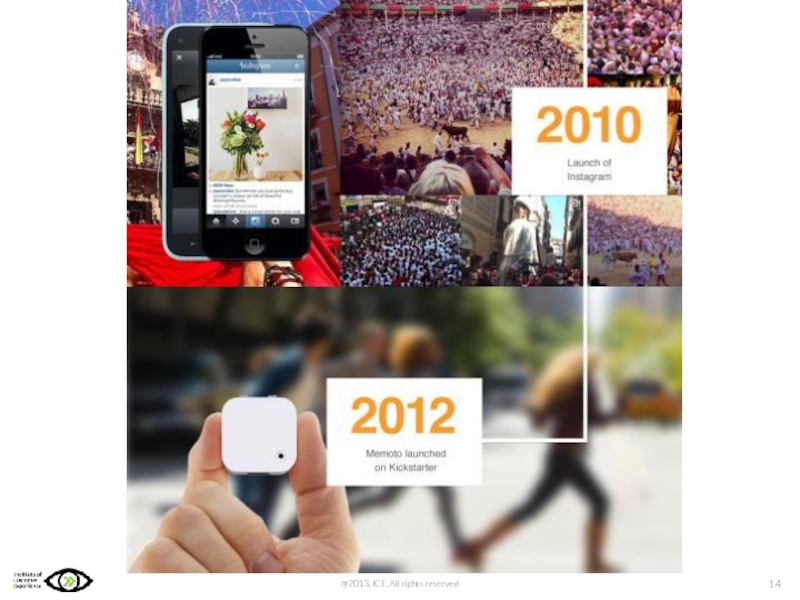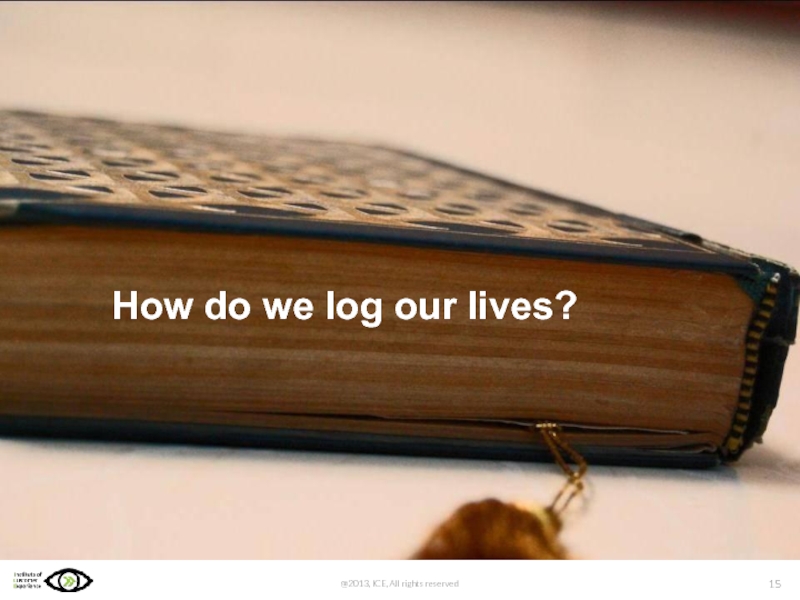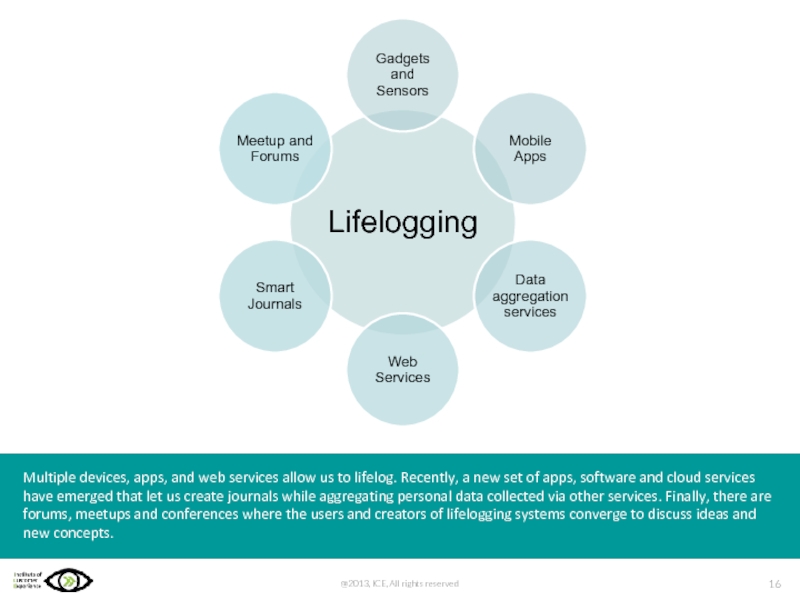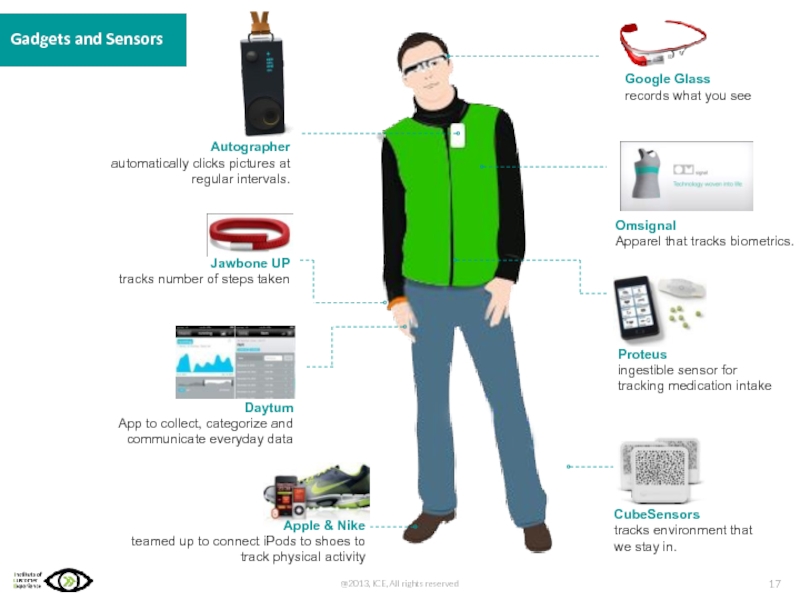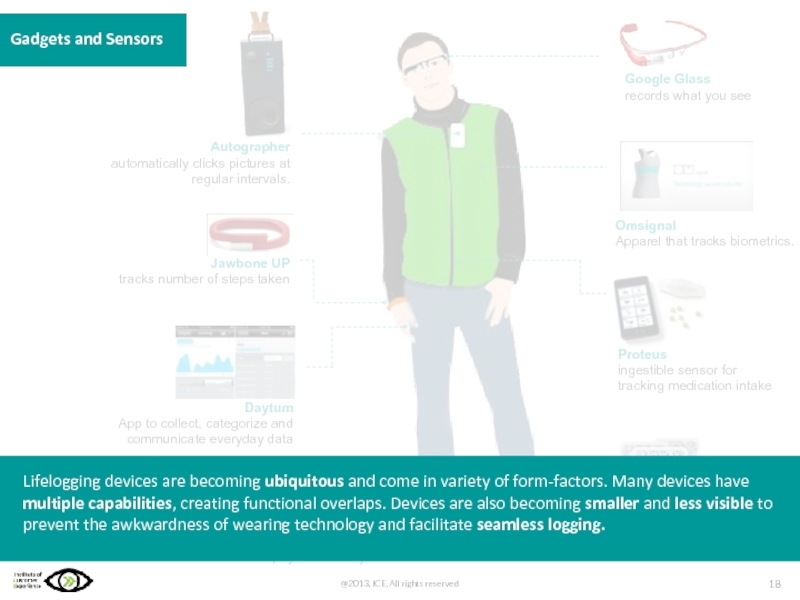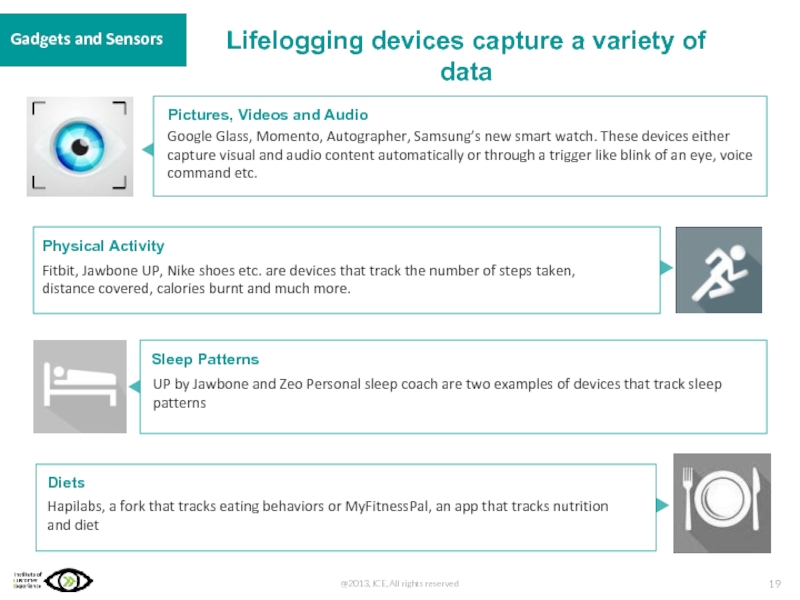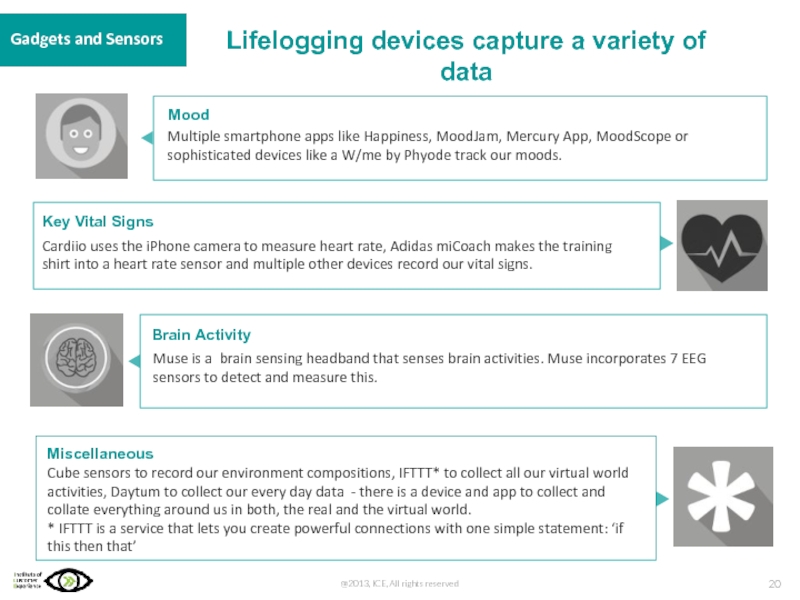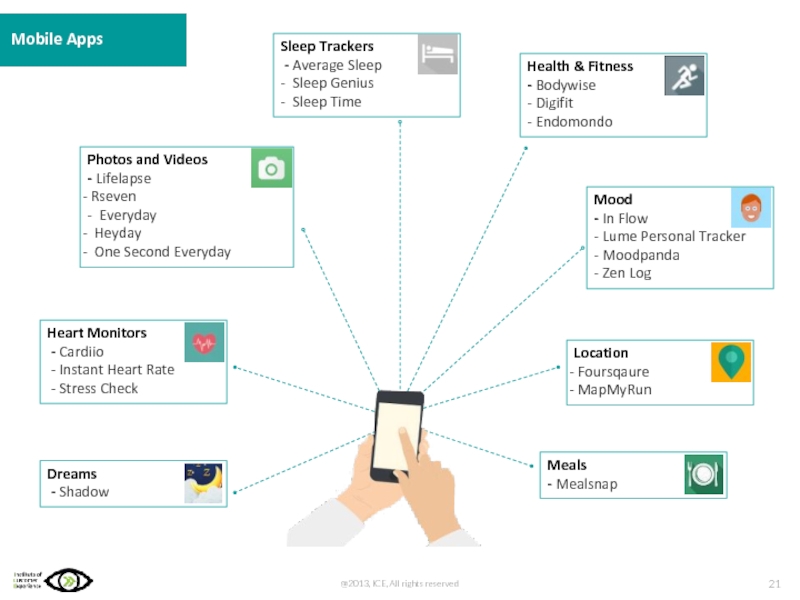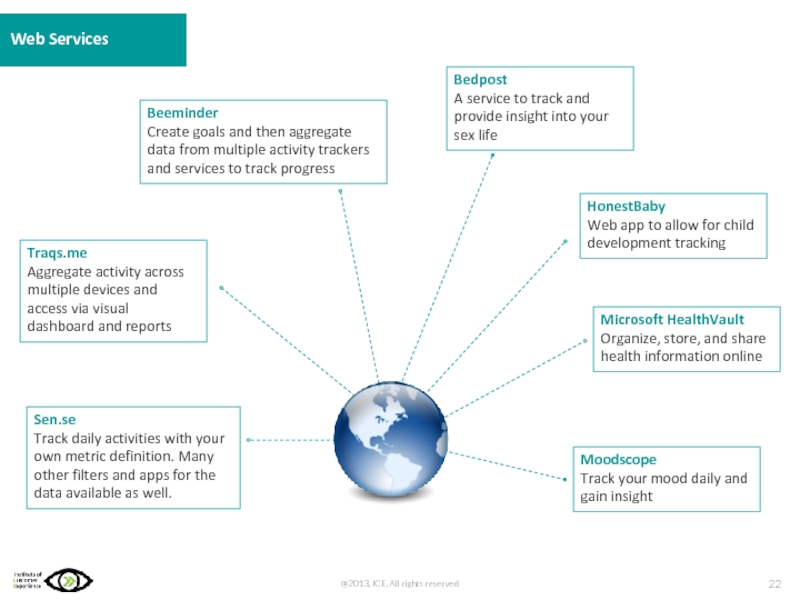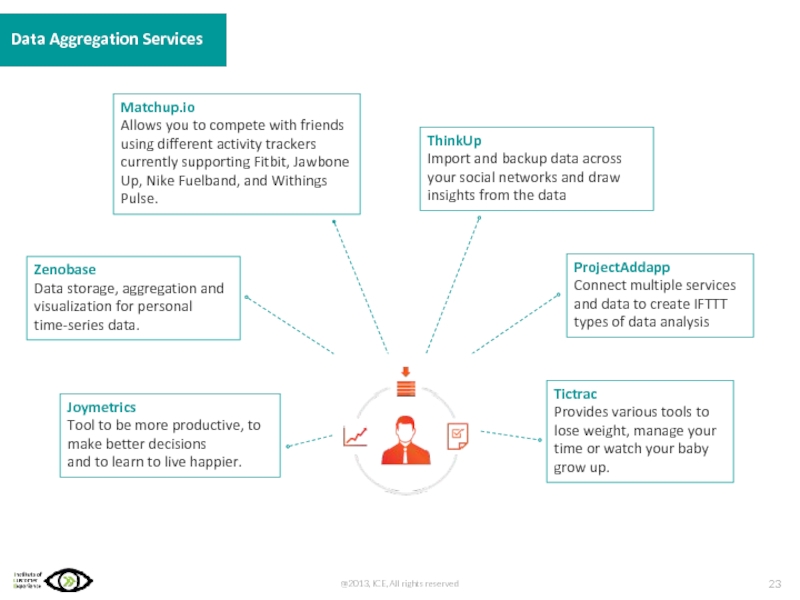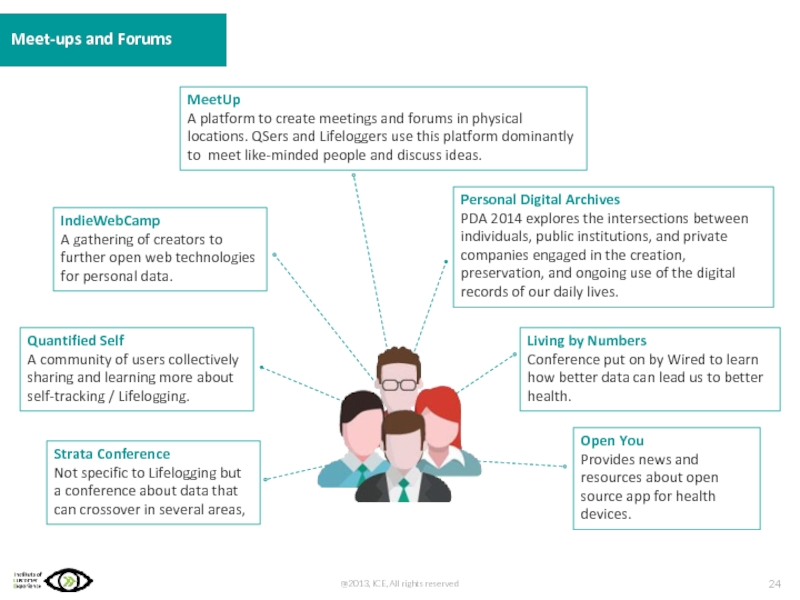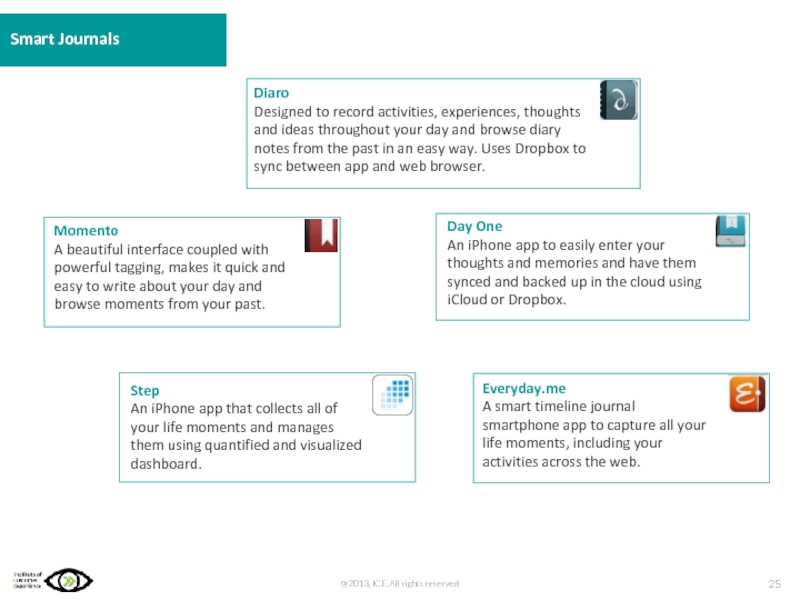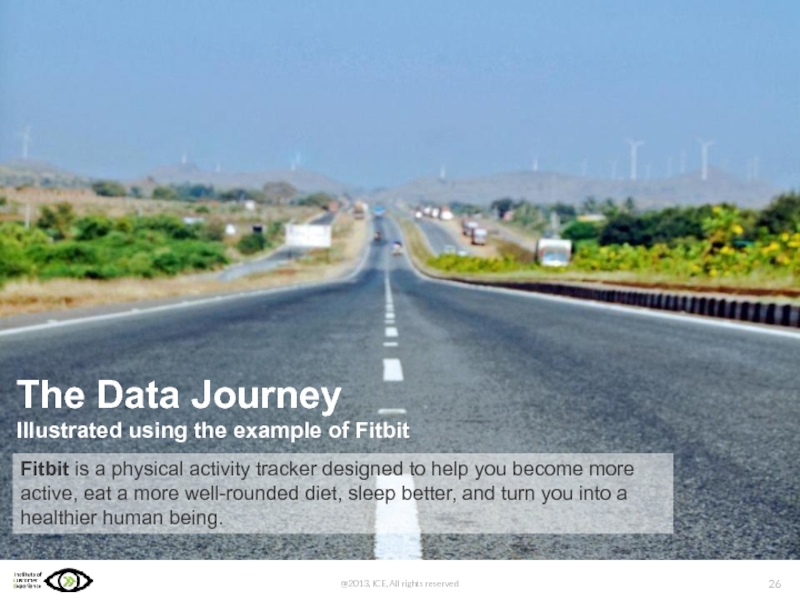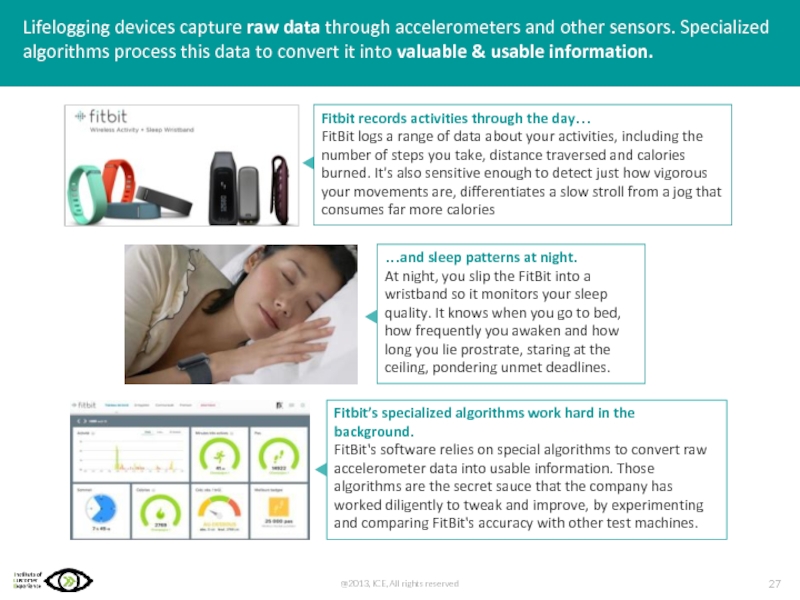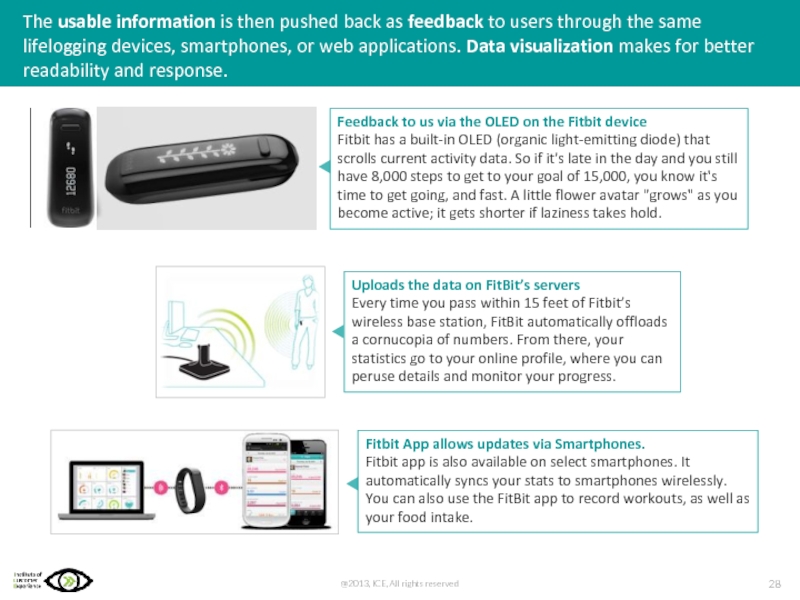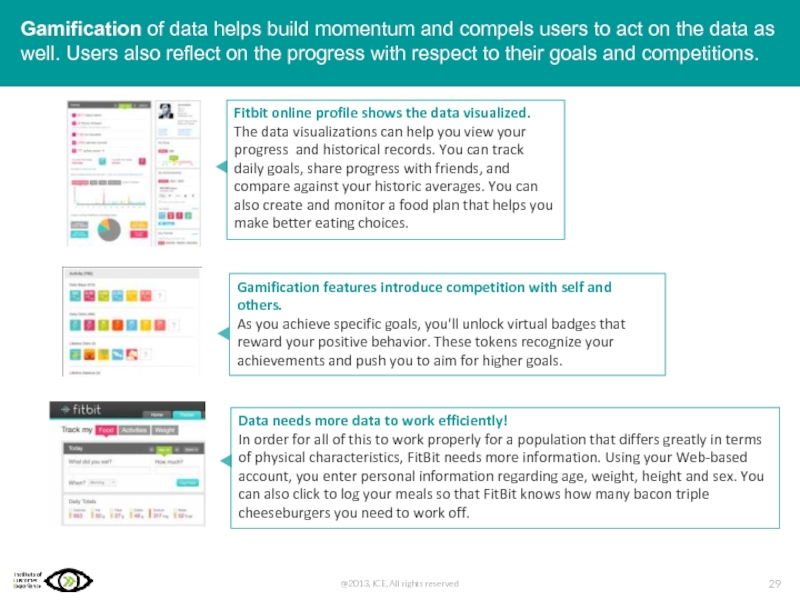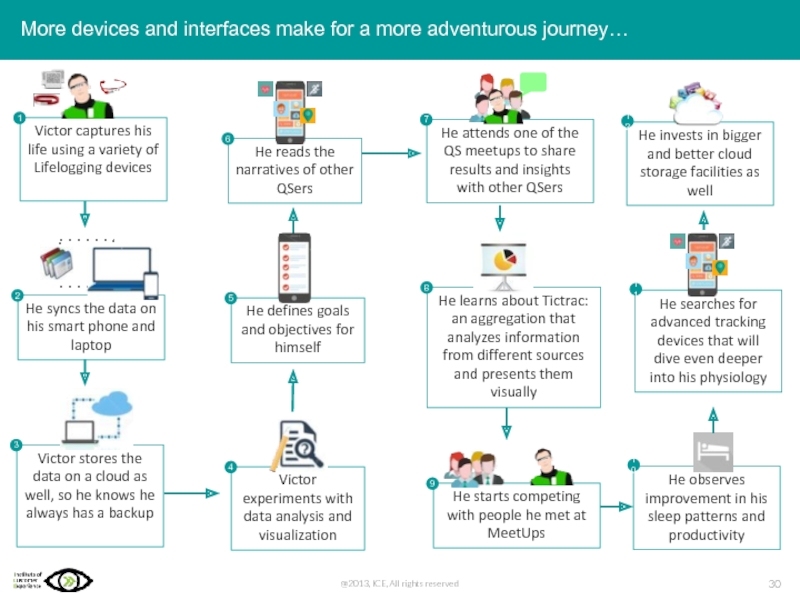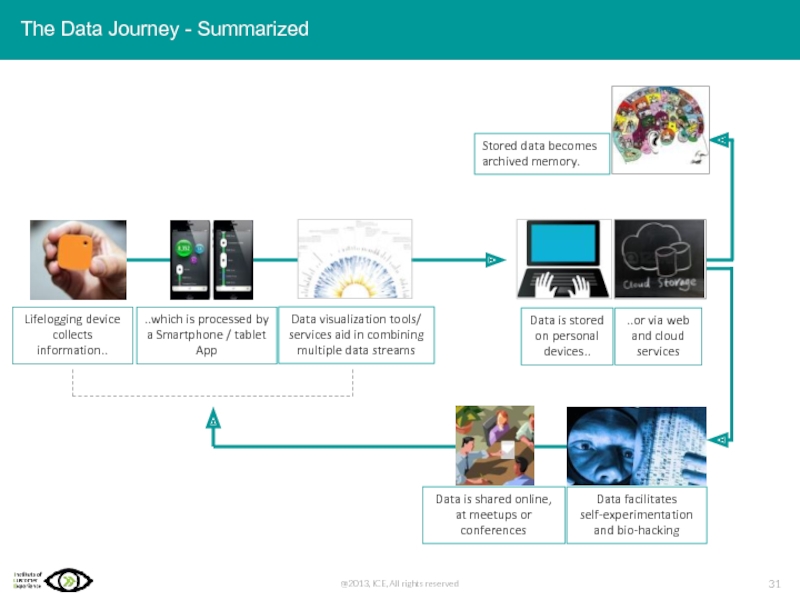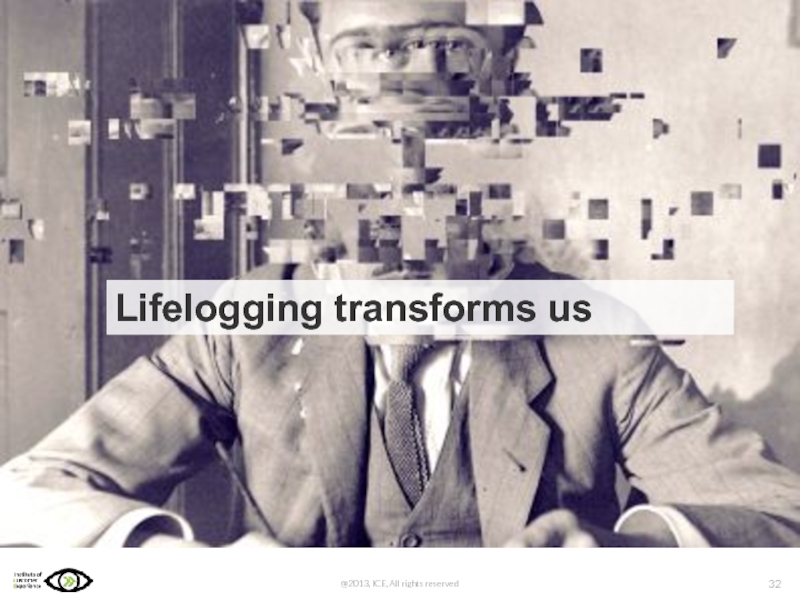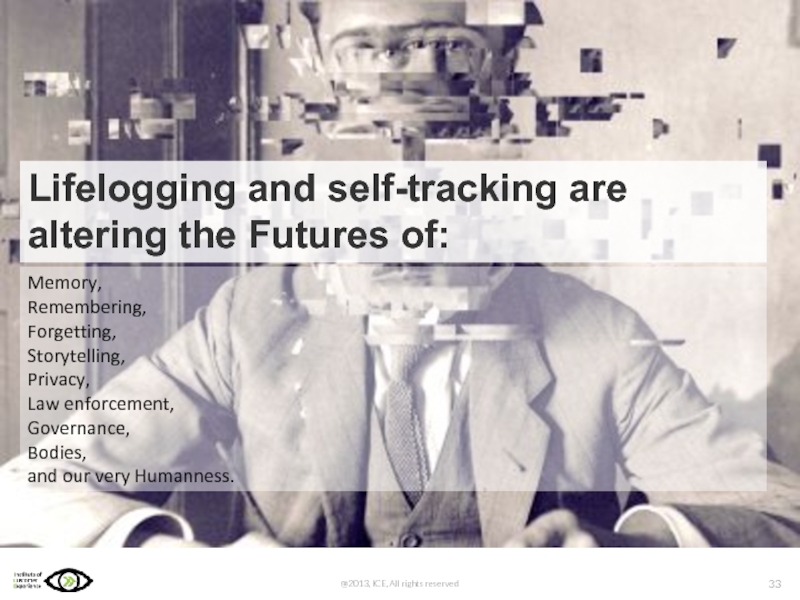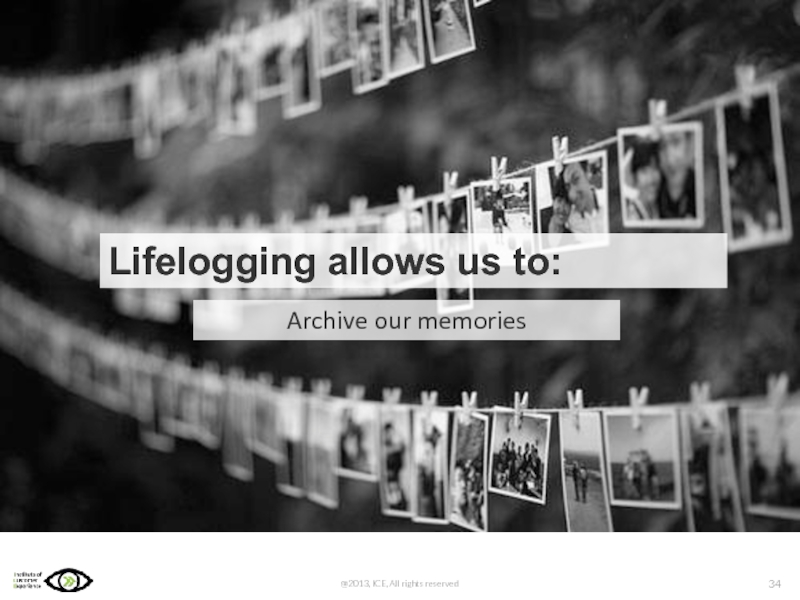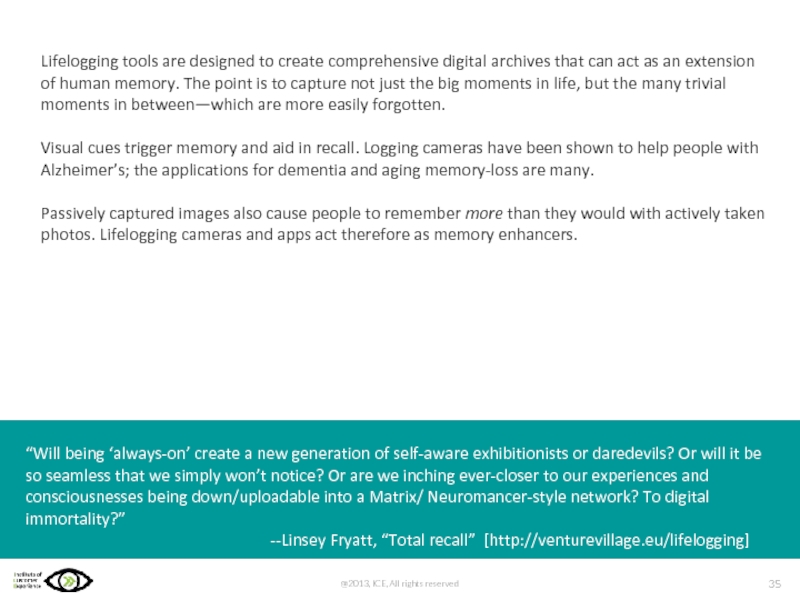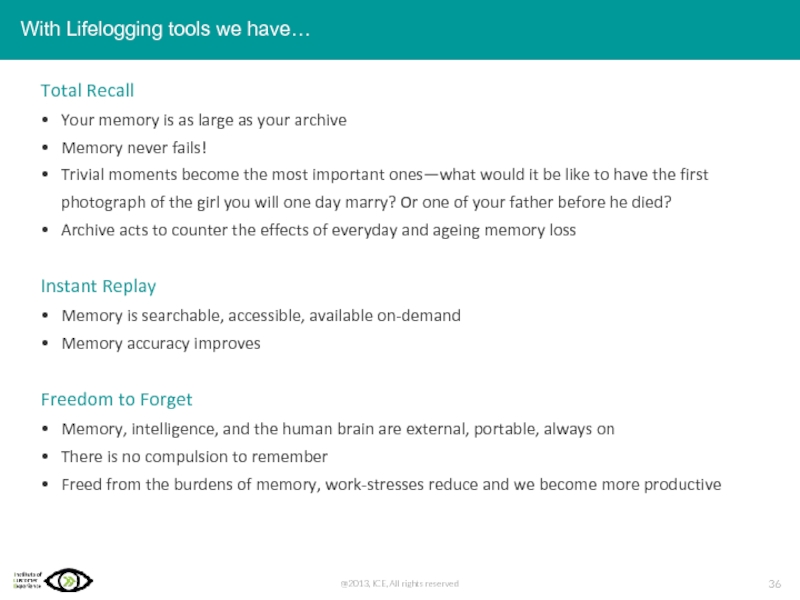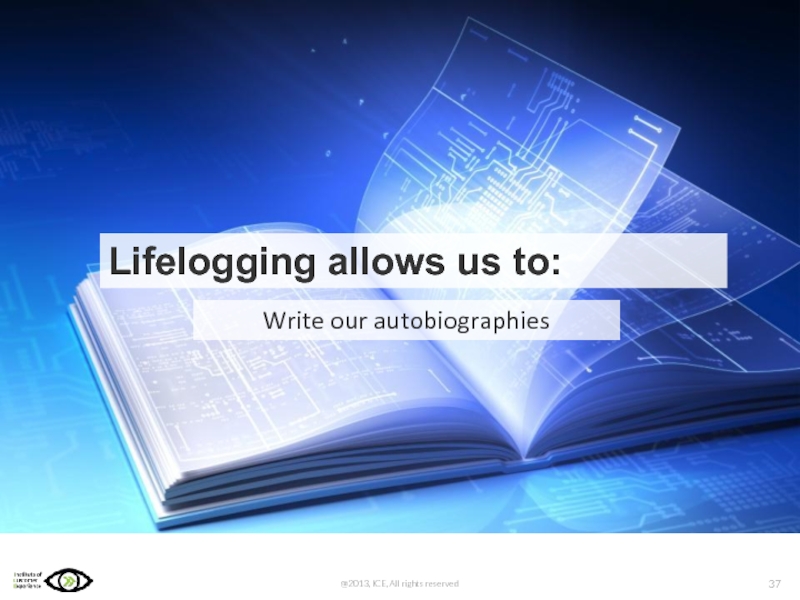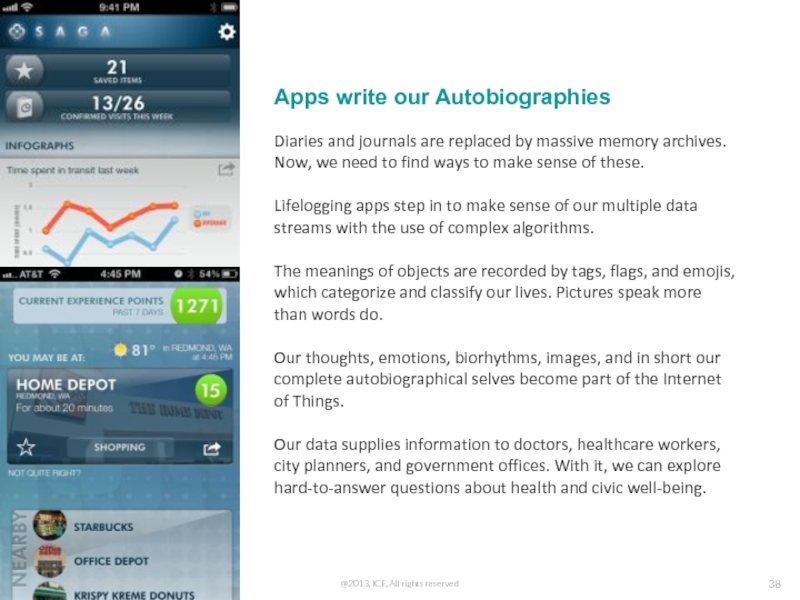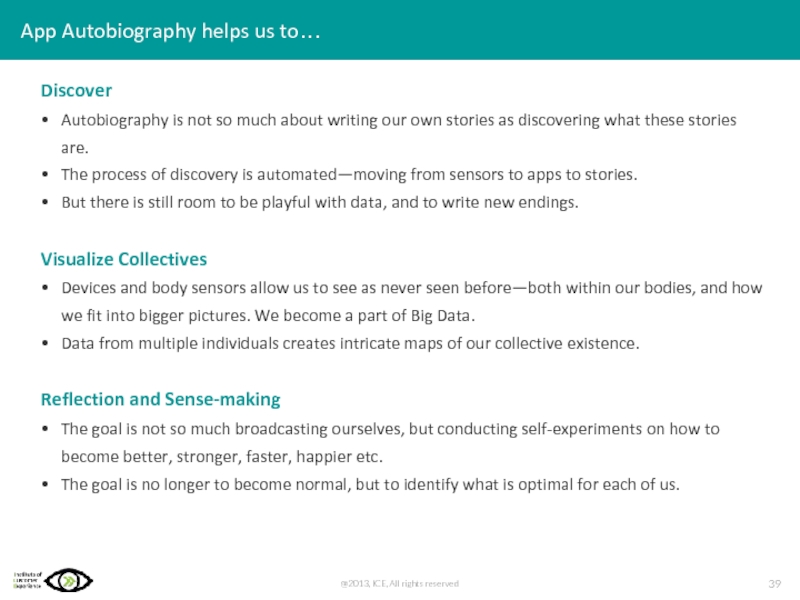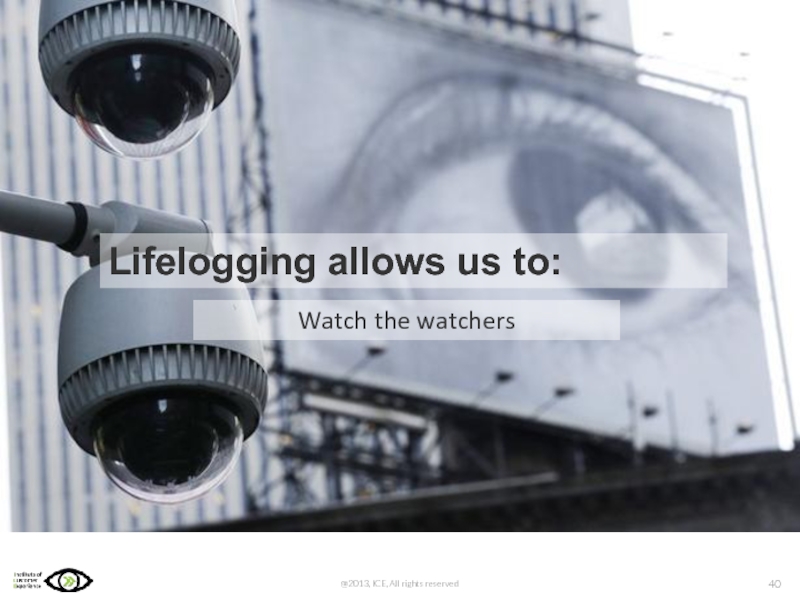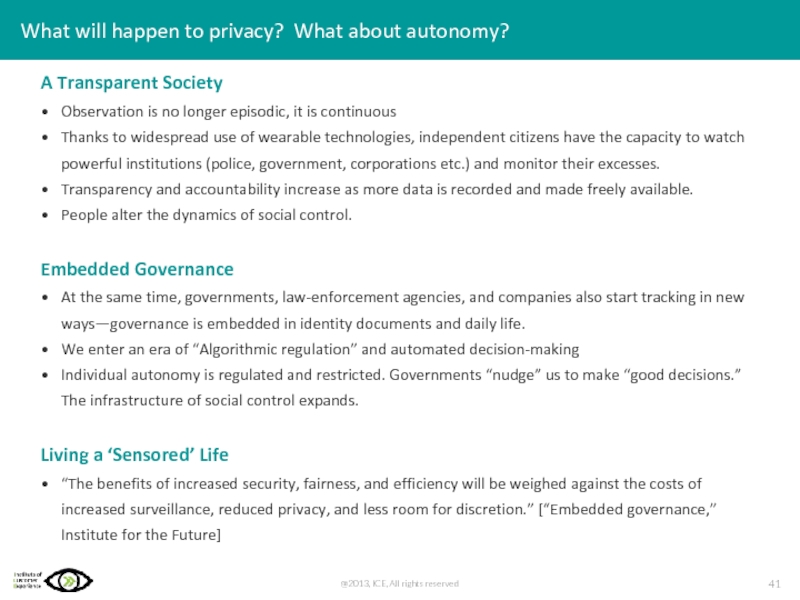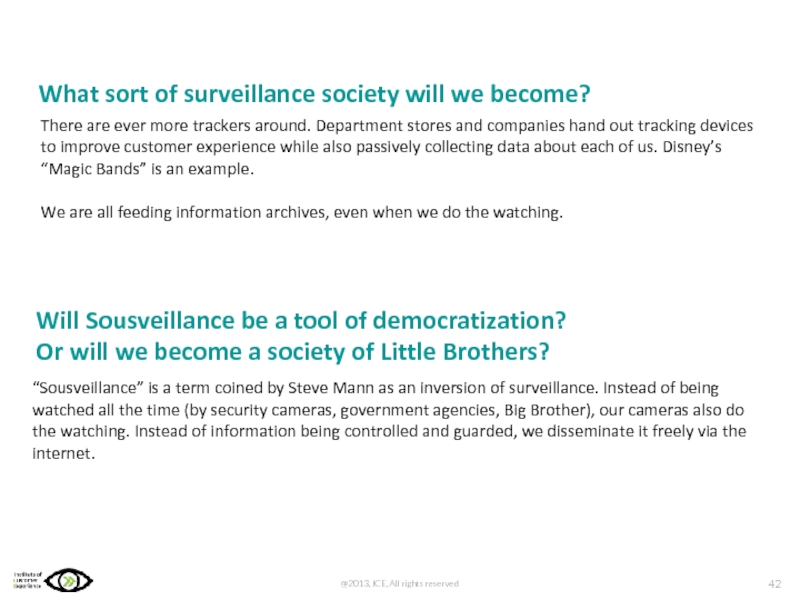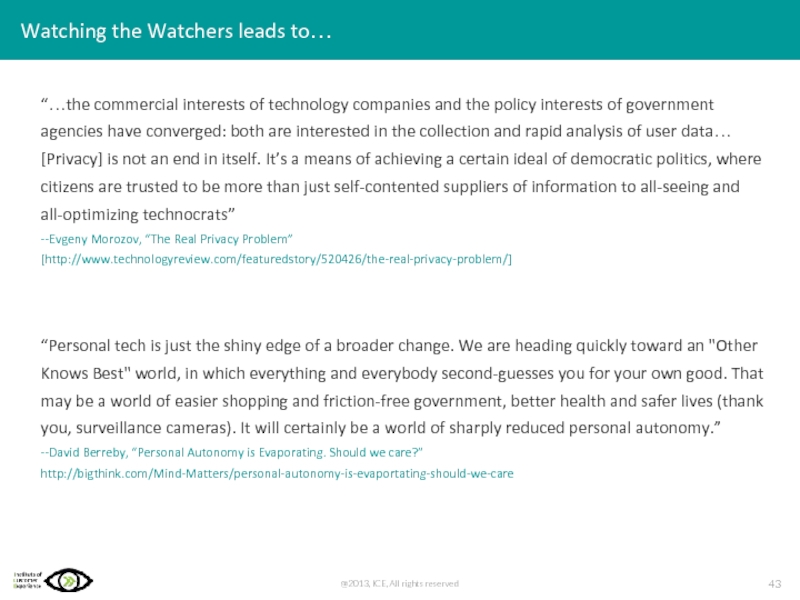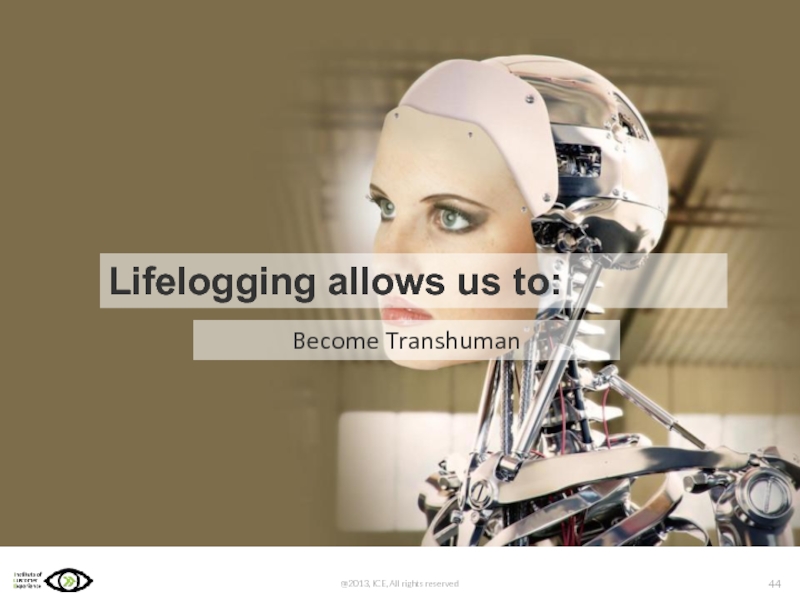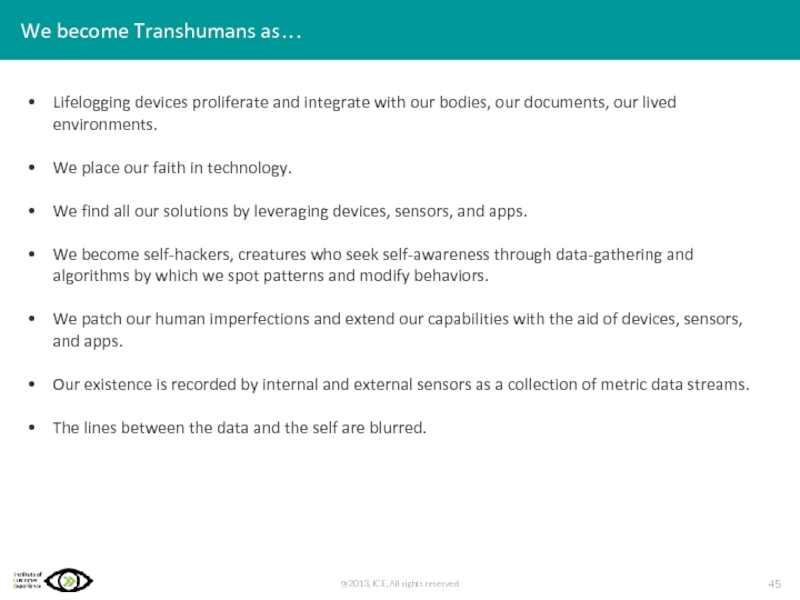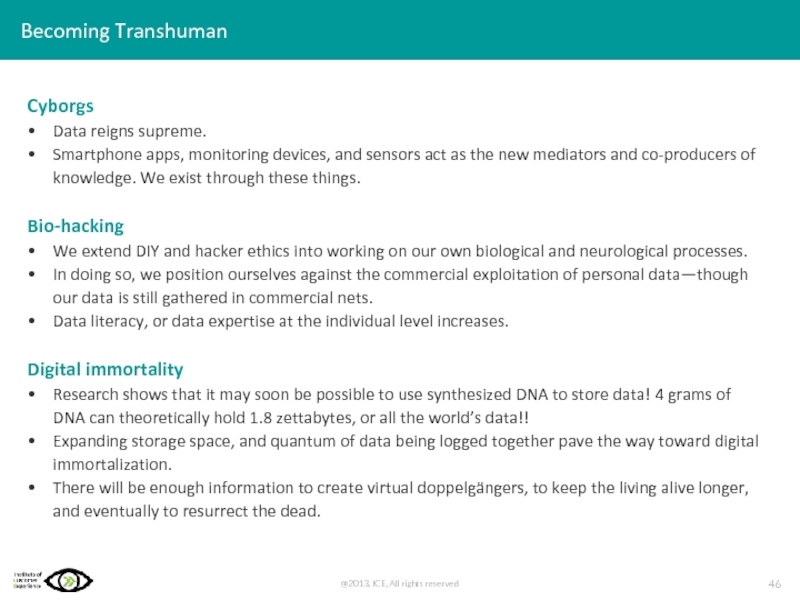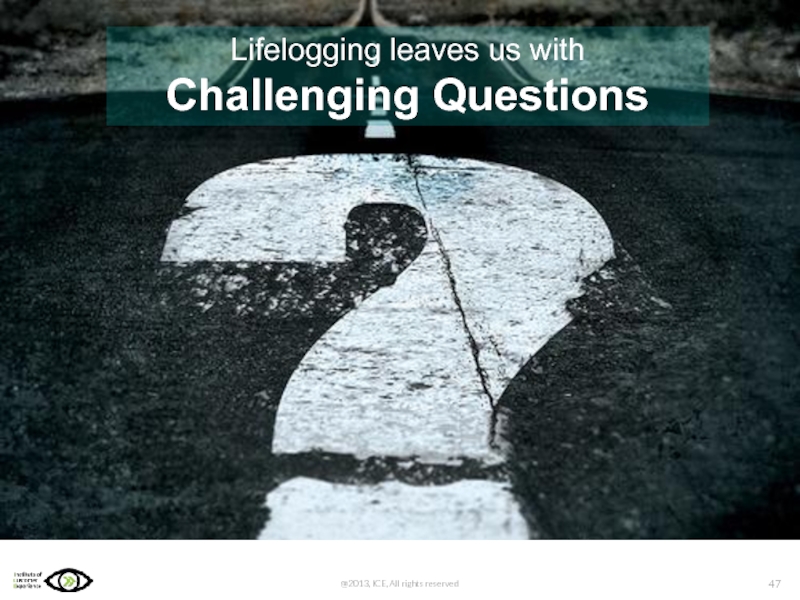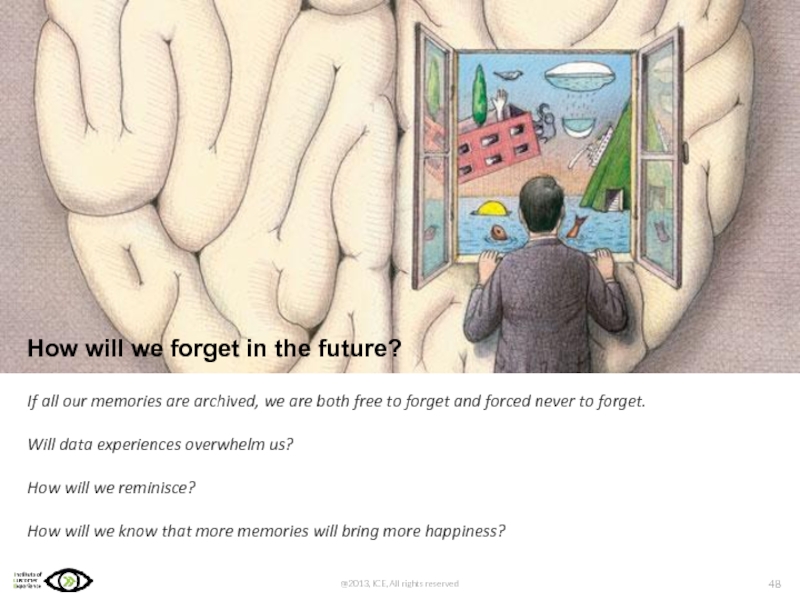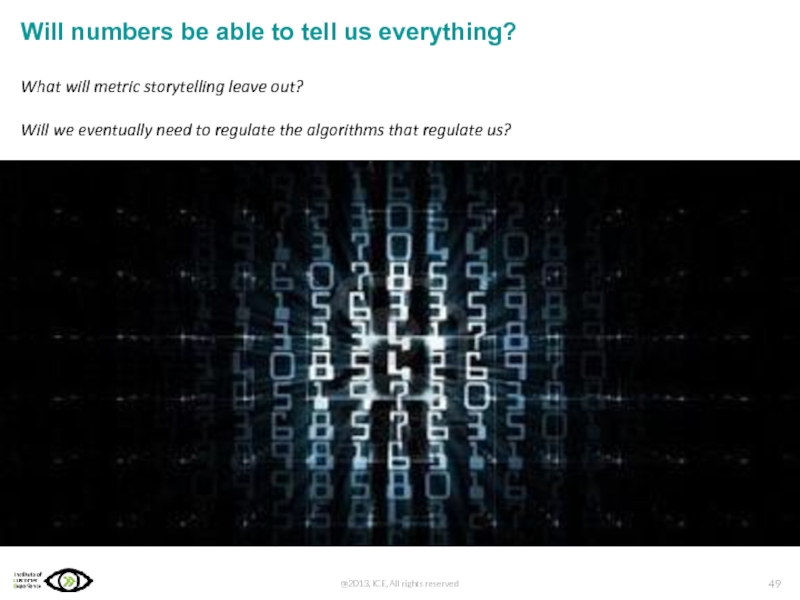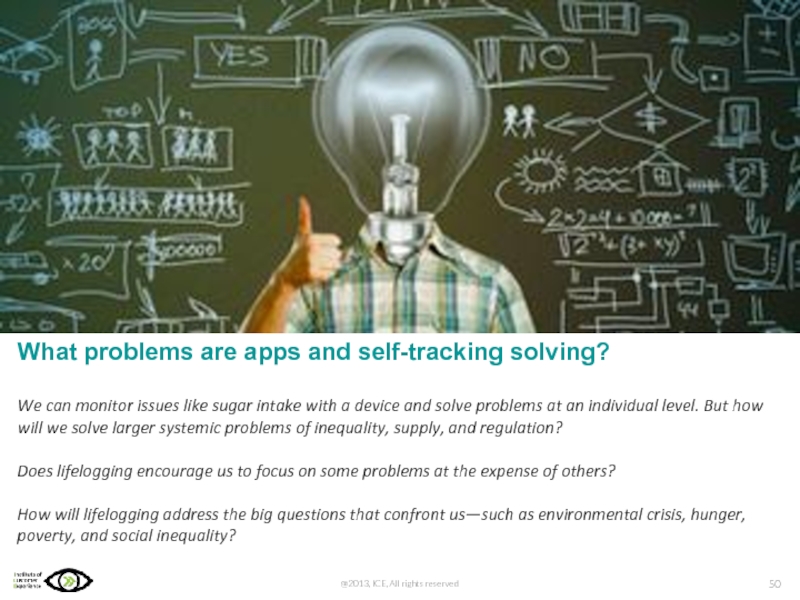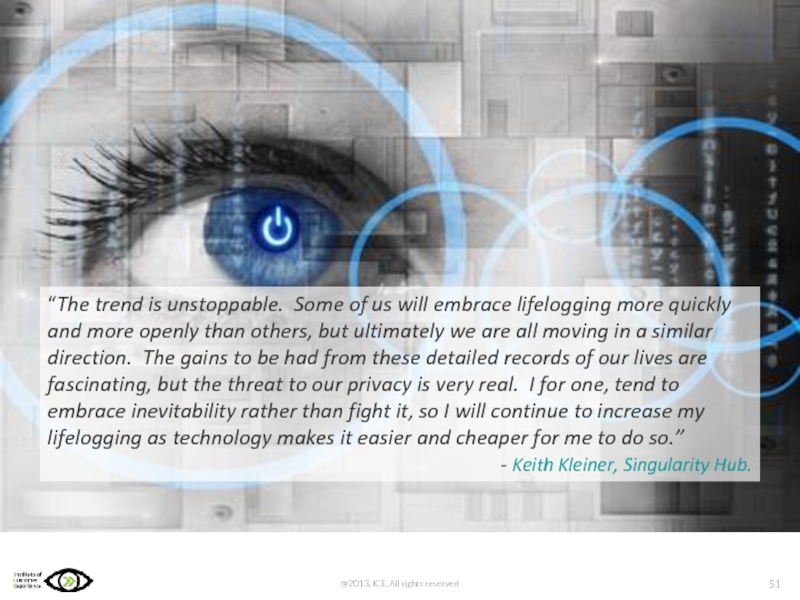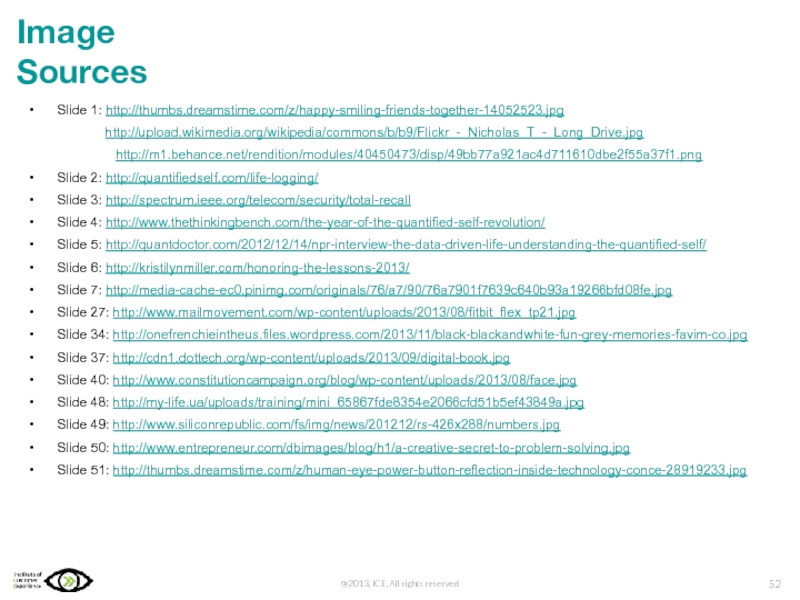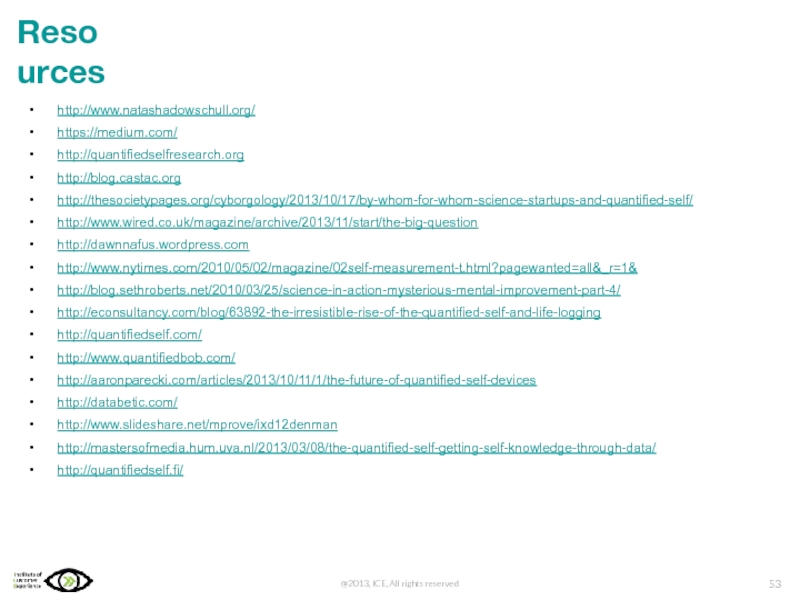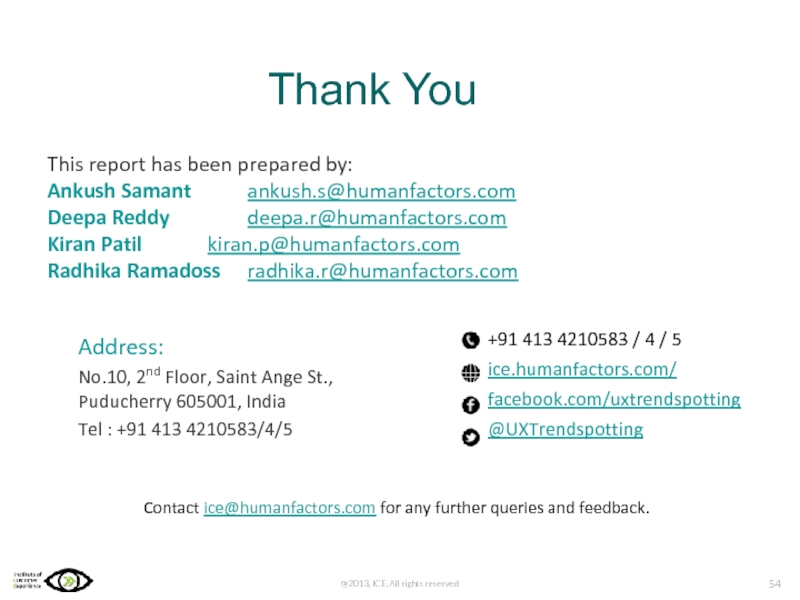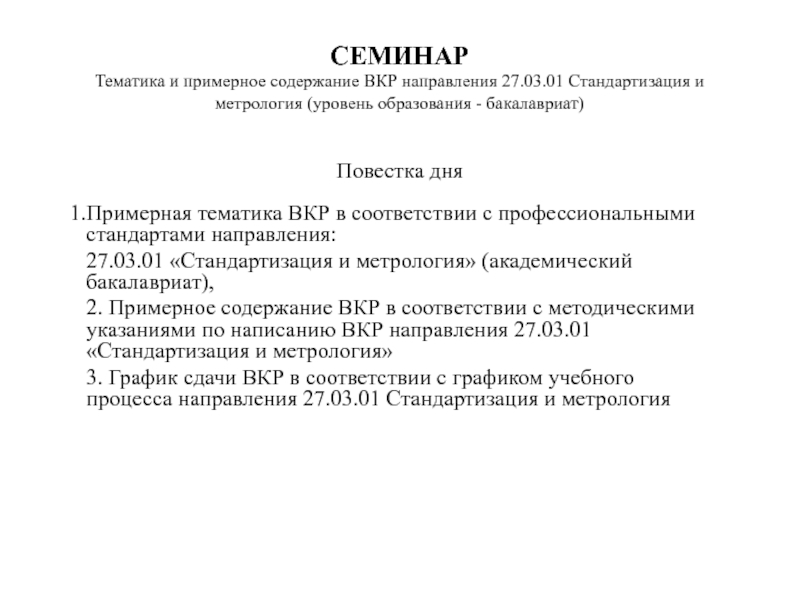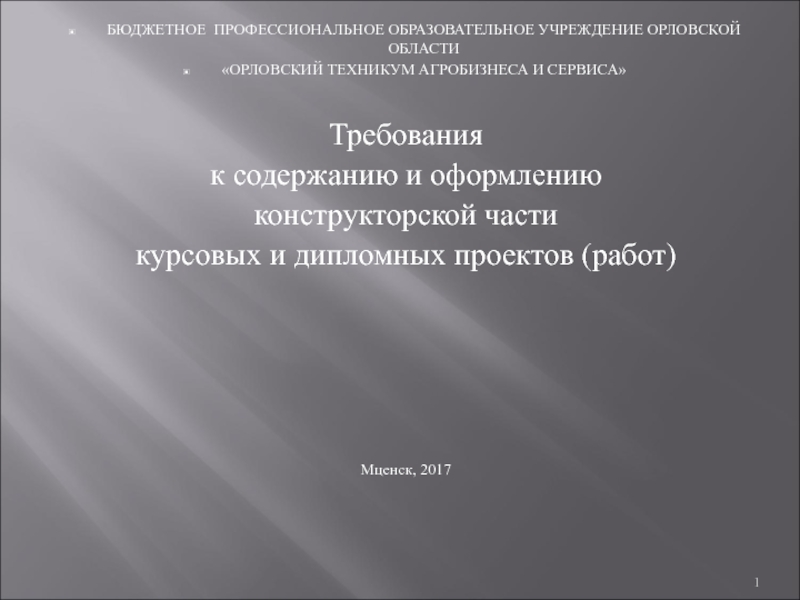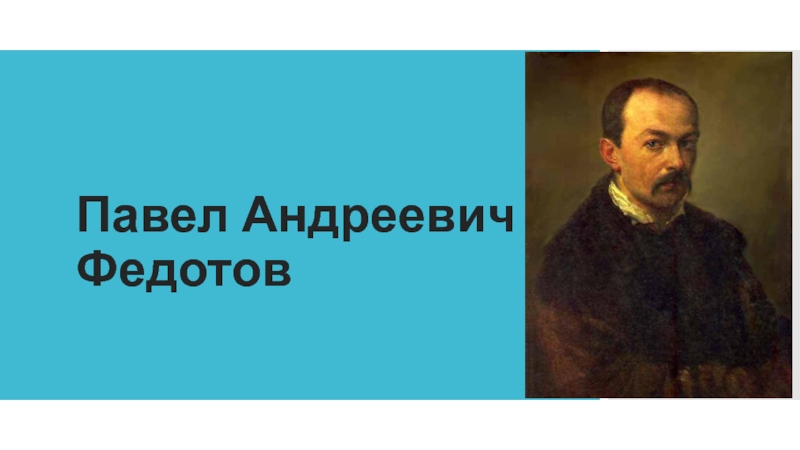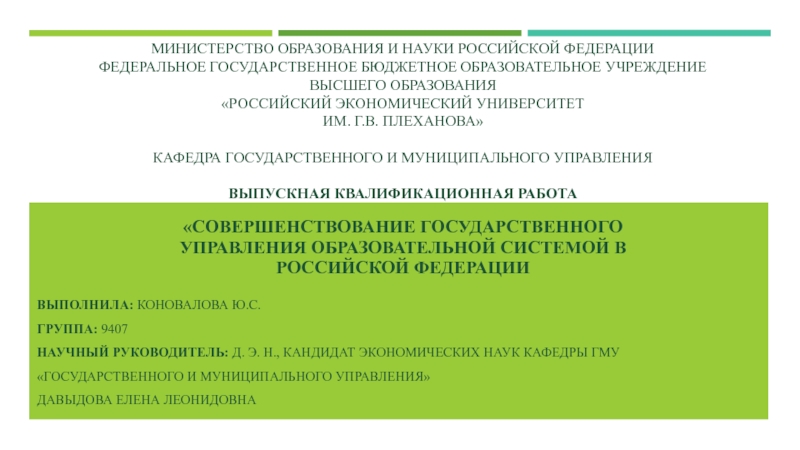- Главная
- Разное
- Дизайн
- Бизнес и предпринимательство
- Аналитика
- Образование
- Развлечения
- Красота и здоровье
- Финансы
- Государство
- Путешествия
- Спорт
- Недвижимость
- Армия
- Графика
- Культурология
- Еда и кулинария
- Лингвистика
- Английский язык
- Астрономия
- Алгебра
- Биология
- География
- Детские презентации
- Информатика
- История
- Литература
- Маркетинг
- Математика
- Медицина
- Менеджмент
- Музыка
- МХК
- Немецкий язык
- ОБЖ
- Обществознание
- Окружающий мир
- Педагогика
- Русский язык
- Технология
- Физика
- Философия
- Химия
- Шаблоны, картинки для презентаций
- Экология
- Экономика
- Юриспруденция
How Lifelogging Transforms Us All презентация
Содержание
- 1. How Lifelogging Transforms Us All
- 2. What is Lifelogging? Lifelogging is the practice
- 3. Lifelogging is the brainchild of Microsoft researcher
- 4. What is the Quantified Self? The Quantified
- 5. The concept was proposed by Gary Wolf
- 6. Lifeloggers and particularly QSers reject anonymous, generalized,
- 7. The central question is What is right
- 8. The Evolution of Lifelogging “Lifelogging is an inevitability” - Kevin Kelly, Co-Founder, Quantified Self.
- 9. “…many of our problems come from simply
- 15. How do we log our lives?
- 16. Multiple devices, apps, and web services
- 17. Gadgets and Sensors Google Glass
- 18. Google Glass records what you see
- 19. Lifelogging devices capture a variety
- 20. Mood Multiple smartphone apps
- 21. Mobile Apps Dreams - Shadow
- 22. Web Services Beeminder Create goals
- 23. Matchup.io Allows you to compete with
- 24. Meet-ups and Forums IndieWebCamp A
- 25. Day One An iPhone app to easily
- 26. The Data Journey Illustrated using the example
- 27. Lifelogging devices capture raw data through
- 28. The usable information is then pushed
- 29. Gamification of data helps build momentum
- 30. He searches for advanced tracking devices that
- 31. The Data Journey - Summarized
- 32. Lifelogging transforms us
- 33. Lifelogging and self-tracking are altering the Futures
- 34. Archive our memories Lifelogging allows us to:
- 35. Lifelogging tools are designed to create comprehensive
- 36. Total Recall Your memory is as large
- 37. Write our autobiographies Lifelogging allows us to:
- 38. Diaries and journals are replaced by massive
- 39. Discover Autobiography is not so much about
- 40. Watch the watchers Lifelogging allows us to:
- 41. A Transparent Society Observation is no longer
- 42. There are ever more trackers around. Department
- 43. “…the commercial interests of technology companies and
- 44. Become Transhuman Lifelogging allows us to:
- 45. We become Transhumans as… Lifelogging devices
- 46. Becoming Transhuman Cyborgs Data reigns supreme.
- 47. Lifelogging leaves us with Challenging Questions
- 48. If all our memories are archived, we
- 49. Will numbers be able to tell us
- 50. What problems are apps and self-tracking solving?
- 51. “The trend is unstoppable. Some of us
- 52. Image Sources Slide 1: http://thumbs.dreamstime.com/z/happy-smiling-friends-together-14052523.jpg
- 53. Resources http://www.natashadowschull.org/ https://medium.com/ http://quantifiedselfresearch.org http://blog.castac.org http://thesocietypages.org/cyborgology/2013/10/17/by-whom-for-whom-science-startups-and-quantified-self/
- 54. Address: No.10, 2nd Floor, Saint Ange St., Puducherry 605001,
Слайд 2What is Lifelogging?
Lifelogging is the practice of tracking personal data generated by
Слайд 3Lifelogging is the brainchild of Microsoft researcher Gordon Bell, who used
The goal is to compile a lifelong digital archive or a “portable, infallible, artificial memory,” that contributes to job productivity, medical treatment, school performance and more.
Source: Gordon Bell and Jim Gemmell, “A Digital Life,” Scientific American (2007)
MyLifeBits
Слайд 4What is the Quantified Self?
The Quantified Self (QS) is a movement
Слайд 5The concept was proposed by Gary Wolf and Kevin Kelley of
Data acquisition is through technological devices: wearable sensors, mobile apps, and software interfaces.
Stance is proactive: obtain and act on information via self-diagnosis, self-experimentation etc.
Слайд 6Lifeloggers and particularly QSers reject anonymous, generalized, one-size-fits-all prescriptions.
Practitioners gather
Слайд 7The central question is
What is right for me?
When is my optimal
What do my memories look like?
What diet (dairy, vegan, gluten-free, other) will make me healthiest?
What activities and habits are correlated with mood, productivity , bio-rhythms, and brain function in my life?
What does my data say about me?
Слайд 8
The Evolution of Lifelogging
“Lifelogging is an inevitability”
- Kevin Kelly, Co-Founder, Quantified
Слайд 9“…many of our problems come from simply lacking the instruments to
Gary Wolf
“The Data Driven Life,” New York Times, 2010
Слайд 16
Multiple devices, apps, and web services allow us to lifelog. Recently,
Слайд 17
Gadgets and Sensors
Google Glass
records what you see
Autographer
automatically clicks pictures
Jawbone UP
tracks number of steps taken
Omsignal
Apparel that tracks biometrics.
Proteus
ingestible sensor for tracking medication intake
Daytum
App to collect, categorize and communicate everyday data
Apple & Nike
teamed up to connect iPods to shoes to track physical activity
CubeSensors
tracks environment that we stay in.
Слайд 18Google Glass
records what you see
Autographer
automatically clicks pictures at regular
Jawbone UP
tracks number of steps taken
Omsignal
Apparel that tracks biometrics.
Proteus
ingestible sensor for tracking medication intake
Daytum
App to collect, categorize and communicate everyday data
Apple & Nike
teamed up to connect iPods to shoes to track physical activity
CubeSensors
tracks environment that we stay in.
Gadgets and Sensors
Lifelogging devices are becoming ubiquitous and come in variety of form-factors. Many devices have multiple capabilities, creating functional overlaps. Devices are also becoming smaller and less visible to prevent the awkwardness of wearing technology and facilitate seamless logging.
Gadgets and Sensors
Слайд 19
Lifelogging devices capture a variety of data
Pictures, Videos and Audio
Google Glass, Momento, Autographer, Samsung’s new smart watch. These devices either capture visual and audio content automatically or through a trigger like blink of an eye, voice command etc.
Physical Activity
Fitbit, Jawbone UP, Nike shoes etc. are devices that track the number of steps taken, distance covered, calories burnt and much more.
Sleep Patterns
UP by Jawbone and Zeo Personal sleep coach are two examples of devices that track sleep patterns
Diets
Hapilabs, a fork that tracks eating behaviors or MyFitnessPal, an app that tracks nutrition and diet
Gadgets and Sensors
Слайд 20
Mood
Multiple smartphone apps like Happiness, MoodJam, Mercury App, MoodScope or
Key Vital Signs
Cardiio uses the iPhone camera to measure heart rate, Adidas miCoach makes the training shirt into a heart rate sensor and multiple other devices record our vital signs.
Brain Activity
Muse is a brain sensing headband that senses brain activities. Muse incorporates 7 EEG sensors to detect and measure this.
Miscellaneous
Cube sensors to record our environment compositions, IFTTT* to collect all our virtual world activities, Daytum to collect our every day data - there is a device and app to collect and collate everything around us in both, the real and the virtual world.
* IFTTT is a service that lets you create powerful connections with one simple statement: ‘if this then that’
Lifelogging devices capture a variety of data
Gadgets and Sensors
Слайд 21
Mobile Apps
Dreams
- Shadow
Location
Foursqaure
MapMyRun
Photos and Videos
- Lifelapse
Rseven
-
Heyday
One Second Everyday
Meals
- Mealsnap
Mood
- In Flow
- Lume Personal Tracker
- Moodpanda
- Zen Log
Health & Fitness
- Bodywise
- Digifit
- Endomondo
Sleep Trackers
- Average Sleep
- Sleep Genius
- Sleep Time
Heart Monitors
- Cardiio
- Instant Heart Rate
- Stress Check
Слайд 22
Web Services
Beeminder
Create goals and then aggregate data from multiple activity
Bedpost
A service to track and provide insight into your sex life
HonestBaby
Web app to allow for child development tracking
Microsoft HealthVault Organize, store, and share health information online
Sen.se
Track daily activities with your own metric definition. Many other filters and apps for the data available as well.
Moodscope
Track your mood daily and gain insight
Traqs.me
Aggregate activity across multiple devices and access via visual dashboard and reports
Слайд 23Matchup.io
Allows you to compete with friends using different activity trackers
ProjectAddapp
Connect multiple services and data to create IFTTT types of data analysis
ThinkUp
Import and backup data across your social networks and draw insights from the data
Tictrac
Provides various tools to lose weight, manage your time or watch your baby grow up.
Zenobase
Data storage, aggregation and visualization for personal time-series data.
Joymetrics
Tool to be more productive, to make better decisions
and to learn to live happier.
Data Aggregation Services
Слайд 24
Meet-ups and Forums
IndieWebCamp
A gathering of creators to further open web
Living by Numbers
Conference put on by Wired to learn how better data can lead us to better health.
Open You
Provides news and resources about open source app for health devices.
Quantified Self
A community of users collectively sharing and learning more about self-tracking / Lifelogging.
Personal Digital Archives
PDA 2014 explores the intersections between individuals, public institutions, and private companies engaged in the creation, preservation, and ongoing use of the digital records of our daily lives.
Strata Conference
Not specific to Lifelogging but a conference about data that can crossover in several areas,
MeetUp
A platform to create meetings and forums in physical locations. QSers and Lifeloggers use this platform dominantly to meet like-minded people and discuss ideas.
Слайд 25Day One
An iPhone app to easily enter your thoughts and memories
Diaro
Designed to record activities, experiences, thoughts and ideas throughout your day and browse diary notes from the past in an easy way. Uses Dropbox to sync between app and web browser.
Everyday.me
A smart timeline journal smartphone app to capture all your life moments, including your activities across the web.
Momento
A beautiful interface coupled with powerful tagging, makes it quick and easy to write about your day and browse moments from your past.
Step
An iPhone app that collects all of your life moments and manages them using quantified and visualized dashboard.
Smart Journals
Слайд 26The Data Journey
Illustrated using the example of Fitbit
Fitbit is a physical
Слайд 27
Lifelogging devices capture raw data through accelerometers and other sensors. Specialized
Fitbit records activities through the day…
FitBit logs a range of data about your activities, including the number of steps you take, distance traversed and calories burned. It's also sensitive enough to detect just how vigorous your movements are, differentiates a slow stroll from a jog that consumes far more calories
…and sleep patterns at night.
At night, you slip the FitBit into a wristband so it monitors your sleep quality. It knows when you go to bed, how frequently you awaken and how long you lie prostrate, staring at the ceiling, pondering unmet deadlines.
Fitbit’s specialized algorithms work hard in the background.
FitBit's software relies on special algorithms to convert raw accelerometer data into usable information. Those algorithms are the secret sauce that the company has worked diligently to tweak and improve, by experimenting and comparing FitBit's accuracy with other test machines.
Слайд 28
The usable information is then pushed back as feedback to users
Feedback to us via the OLED on the Fitbit device
Fitbit has a built-in OLED (organic light-emitting diode) that scrolls current activity data. So if it's late in the day and you still have 8,000 steps to get to your goal of 15,000, you know it's time to get going, and fast. A little flower avatar "grows" as you become active; it gets shorter if laziness takes hold.
Uploads the data on FitBit’s servers
Every time you pass within 15 feet of Fitbit’s wireless base station, FitBit automatically offloads a cornucopia of numbers. From there, your statistics go to your online profile, where you can peruse details and monitor your progress.
Fitbit App allows updates via Smartphones.
Fitbit app is also available on select smartphones. It automatically syncs your stats to smartphones wirelessly. You can also use the FitBit app to record workouts, as well as your food intake.
Слайд 29
Gamification of data helps build momentum and compels users to act
Fitbit online profile shows the data visualized.
The data visualizations can help you view your progress and historical records. You can track daily goals, share progress with friends, and compare against your historic averages. You can also create and monitor a food plan that helps you make better eating choices.
Gamification features introduce competition with self and others.
As you achieve specific goals, you'll unlock virtual badges that reward your positive behavior. These tokens recognize your achievements and push you to aim for higher goals.
Data needs more data to work efficiently!
In order for all of this to work properly for a population that differs greatly in terms of physical characteristics, FitBit needs more information. Using your Web-based account, you enter personal information regarding age, weight, height and sex. You can also click to log your meals so that FitBit knows how many bacon triple cheeseburgers you need to work off.
Слайд 30He searches for advanced tracking devices that will dive even deeper
More devices and interfaces make for a more adventurous journey…
Victor captures his life using a variety of Lifelogging devices
1
He syncs the data on his smart phone and laptop
2
Victor stores the data on a cloud as well, so he knows he always has a backup
3
Victor experiments with data analysis and visualization
4
He defines goals and objectives for himself
5
He reads the narratives of other QSers
6
He attends one of the QS meetups to share results and insights with other QSers
7
He learns about Tictrac: an aggregation that analyzes information from different sources and presents them visually
8
He starts competing with people he met at MeetUps
9
He observes improvement in his sleep patterns and productivity
10
11
He invests in bigger and better cloud storage facilities as well
12
Слайд 31
The Data Journey - Summarized
Lifelogging device
collects information..
..which is processed by
Data visualization tools/
services aid in combining
multiple data streams
Data is stored
on personal
devices..
..or via web and cloud services
Stored data becomes
archived memory.
Data facilitates self-experimentation
and bio-hacking
Data is shared online,
at meetups or conferences
Слайд 33Lifelogging and self-tracking are altering the Futures of:
Memory,
Remembering,
Forgetting,
Storytelling,
Privacy,
Law enforcement,
Governance,
Bodies,
and our very Humanness.
Слайд 35Lifelogging tools are designed to create comprehensive digital archives that can
Visual cues trigger memory and aid in recall. Logging cameras have been shown to help people with Alzheimer’s; the applications for dementia and aging memory-loss are many.
Passively captured images also cause people to remember more than they would with actively taken photos. Lifelogging cameras and apps act therefore as memory enhancers.
“Will being ‘always-on’ create a new generation of self-aware exhibitionists or daredevils? Or will it be so seamless that we simply won’t notice? Or are we inching ever-closer to our experiences and consciousnesses being down/uploadable into a Matrix/ Neuromancer-style network? To digital immortality?”
--Linsey Fryatt, “Total recall” [http://venturevillage.eu/lifelogging]
Слайд 36Total Recall
Your memory is as large as your archive
Memory never fails!
Trivial
Archive acts to counter the effects of everyday and ageing memory loss
Instant Replay
Memory is searchable, accessible, available on-demand
Memory accuracy improves
Freedom to Forget
Memory, intelligence, and the human brain are external, portable, always on
There is no compulsion to remember
Freed from the burdens of memory, work-stresses reduce and we become more productive
With Lifelogging tools we have…
Слайд 38Diaries and journals are replaced by massive memory archives. Now, we
Lifelogging apps step in to make sense of our multiple data streams with the use of complex algorithms.
The meanings of objects are recorded by tags, flags, and emojis, which categorize and classify our lives. Pictures speak more than words do.
Our thoughts, emotions, biorhythms, images, and in short our complete autobiographical selves become part of the Internet of Things.
Our data supplies information to doctors, healthcare workers, city planners, and government offices. With it, we can explore hard-to-answer questions about health and civic well-being.
Apps write our Autobiographies
Слайд 39Discover
Autobiography is not so much about writing our own stories as
The process of discovery is automated—moving from sensors to apps to stories.
But there is still room to be playful with data, and to write new endings.
Visualize Collectives
Devices and body sensors allow us to see as never seen before—both within our bodies, and how we fit into bigger pictures. We become a part of Big Data.
Data from multiple individuals creates intricate maps of our collective existence.
Reflection and Sense-making
The goal is not so much broadcasting ourselves, but conducting self-experiments on how to become better, stronger, faster, happier etc.
The goal is no longer to become normal, but to identify what is optimal for each of us.
App Autobiography helps us to…
Слайд 41A Transparent Society
Observation is no longer episodic, it is continuous
Thanks to
Transparency and accountability increase as more data is recorded and made freely available.
People alter the dynamics of social control.
Embedded Governance
At the same time, governments, law-enforcement agencies, and companies also start tracking in new ways—governance is embedded in identity documents and daily life.
We enter an era of “Algorithmic regulation” and automated decision-making
Individual autonomy is regulated and restricted. Governments “nudge” us to make “good decisions.” The infrastructure of social control expands.
Living a ‘Sensored’ Life
“The benefits of increased security, fairness, and efficiency will be weighed against the costs of increased surveillance, reduced privacy, and less room for discretion.” [“Embedded governance,” Institute for the Future]
What will happen to privacy? What about autonomy?
Слайд 42There are ever more trackers around. Department stores and companies hand
We are all feeding information archives, even when we do the watching.
What sort of surveillance society will we become?
Will Sousveillance be a tool of democratization?
Or will we become a society of Little Brothers?
“Sousveillance” is a term coined by Steve Mann as an inversion of surveillance. Instead of being watched all the time (by security cameras, government agencies, Big Brother), our cameras also do the watching. Instead of information being controlled and guarded, we disseminate it freely via the internet.
Слайд 43“…the commercial interests of technology companies and the policy interests of
--Evgeny Morozov, “The Real Privacy Problem”
[http://www.technologyreview.com/featuredstory/520426/the-real-privacy-problem/]
“Personal tech is just the shiny edge of a broader change. We are heading quickly toward an "Other Knows Best" world, in which everything and everybody second-guesses you for your own good. That may be a world of easier shopping and friction-free government, better health and safer lives (thank you, surveillance cameras). It will certainly be a world of sharply reduced personal autonomy.”
--David Berreby, “Personal Autonomy is Evaporating. Should we care?”
http://bigthink.com/Mind-Matters/personal-autonomy-is-evaportating-should-we-care
Watching the Watchers leads to…
Слайд 45
We become Transhumans as…
Lifelogging devices proliferate and integrate with our bodies,
We place our faith in technology.
We find all our solutions by leveraging devices, sensors, and apps.
We become self-hackers, creatures who seek self-awareness through data-gathering and algorithms by which we spot patterns and modify behaviors.
We patch our human imperfections and extend our capabilities with the aid of devices, sensors, and apps.
Our existence is recorded by internal and external sensors as a collection of metric data streams.
The lines between the data and the self are blurred.
Слайд 46
Becoming Transhuman
Cyborgs
Data reigns supreme.
Smartphone apps, monitoring devices, and sensors act
Bio-hacking
We extend DIY and hacker ethics into working on our own biological and neurological processes.
In doing so, we position ourselves against the commercial exploitation of personal data—though our data is still gathered in commercial nets.
Data literacy, or data expertise at the individual level increases.
Digital immortality
Research shows that it may soon be possible to use synthesized DNA to store data! 4 grams of DNA can theoretically hold 1.8 zettabytes, or all the world’s data!!
Expanding storage space, and quantum of data being logged together pave the way toward digital immortalization.
There will be enough information to create virtual doppelgängers, to keep the living alive longer, and eventually to resurrect the dead.
Слайд 48If all our memories are archived, we are both free to
Will data experiences overwhelm us?
How will we reminisce?
How will we know that more memories will bring more happiness?
How will we forget in the future?
Слайд 49Will numbers be able to tell us everything?
What will metric storytelling
Will we eventually need to regulate the algorithms that regulate us?
Слайд 50What problems are apps and self-tracking solving?
We can monitor issues like
Does lifelogging encourage us to focus on some problems at the expense of others?
How will lifelogging address the big questions that confront us—such as environmental crisis, hunger, poverty, and social inequality?
Слайд 51“The trend is unstoppable. Some of us will embrace lifelogging more
- Keith Kleiner, Singularity Hub.
Слайд 52Image Sources
Slide 1: http://thumbs.dreamstime.com/z/happy-smiling-friends-together-14052523.jpg
http://m1.behance.net/rendition/modules/40450473/disp/49bb77a921ac4d711610dbe2f55a37f1.png
Slide 2: http://quantifiedself.com/life-logging/
Slide 3: http://spectrum.ieee.org/telecom/security/total-recall
Slide 4: http://www.thethinkingbench.com/the-year-of-the-quantified-self-revolution/
Slide 5: http://quantdoctor.com/2012/12/14/npr-interview-the-data-driven-life-understanding-the-quantified-self/
Slide 6: http://kristilynmiller.com/honoring-the-lessons-2013/
Slide 7: http://media-cache-ec0.pinimg.com/originals/76/a7/90/76a7901f7639c640b93a19266bfd08fe.jpg
Slide 27: http://www.mailmovement.com/wp-content/uploads/2013/08/fitbit_flex_tp21.jpg
Slide 34: http://onefrenchieintheus.files.wordpress.com/2013/11/black-blackandwhite-fun-grey-memories-favim-co.jpg
Slide 37: http://cdn1.dottech.org/wp-content/uploads/2013/09/digital-book.jpg
Slide 40: http://www.constitutioncampaign.org/blog/wp-content/uploads/2013/08/face.jpg
Slide 48: http://my-life.ua/uploads/training/mini_65867fde8354e2066cfd51b5ef43849a.jpg
Slide 49: http://www.siliconrepublic.com/fs/img/news/201212/rs-426x288/numbers.jpg
Slide 50: http://www.entrepreneur.com/dbimages/blog/h1/a-creative-secret-to-problem-solving.jpg
Slide 51: http://thumbs.dreamstime.com/z/human-eye-power-button-reflection-inside-technology-conce-28919233.jpg
Слайд 53Resources
http://www.natashadowschull.org/
https://medium.com/
http://quantifiedselfresearch.org
http://blog.castac.org
http://thesocietypages.org/cyborgology/2013/10/17/by-whom-for-whom-science-startups-and-quantified-self/
http://www.wired.co.uk/magazine/archive/2013/11/start/the-big-question
http://dawnnafus.wordpress.com
http://www.nytimes.com/2010/05/02/magazine/02self-measurement-t.html?pagewanted=all&_r=1&
http://blog.sethroberts.net/2010/03/25/science-in-action-mysterious-mental-improvement-part-4/
http://econsultancy.com/blog/63892-the-irresistible-rise-of-the-quantified-self-and-life-logging
http://quantifiedself.com/
http://www.quantifiedbob.com/
http://aaronparecki.com/articles/2013/10/11/1/the-future-of-quantified-self-devices
http://databetic.com/
http://www.slideshare.net/mprove/ixd12denman
http://mastersofmedia.hum.uva.nl/2013/03/08/the-quantified-self-getting-self-knowledge-through-data/
http://quantifiedself.fi/
Слайд 54Address:
No.10, 2nd Floor, Saint Ange St.,
Puducherry 605001, India
Tel : +91 413 4210583/4/5
+91 413
ice.humanfactors.com/
facebook.com/uxtrendspotting
@UXTrendspotting
Contact ice@humanfactors.com for any further queries and feedback.
Thank You
This report has been prepared by:
Ankush Samant ankush.s@humanfactors.com
Deepa Reddy deepa.r@humanfactors.com
Kiran Patil kiran.p@humanfactors.com
Radhika Ramadoss radhika.r@humanfactors.com
